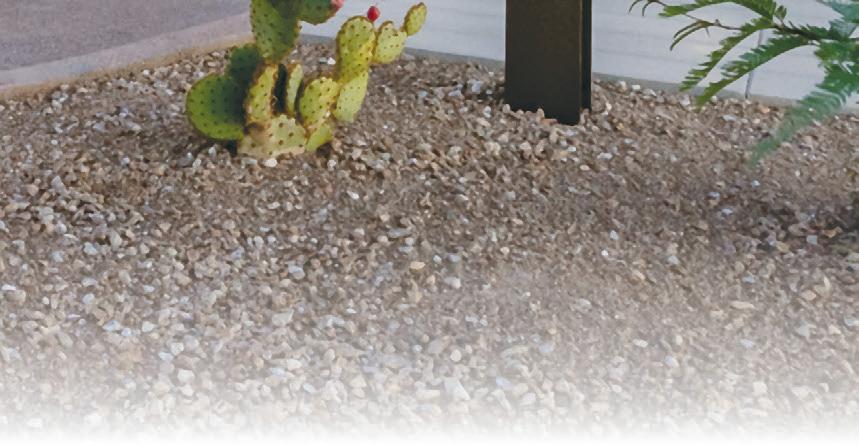HEADLINES | 7
JEWISH NFL PLAYERS
There are a number of Jewish players to keep an eye on this football season.

SPECIAL SECTION | 11 HIGH HOLIDAYS SCHEDULE
Where to watch and attend services this year.

There are a number of Jewish players to keep an eye on this football season.

Where to watch and attend services this year.
Larry Cohen’s father, Jacob, started a jewelry business in Chicago in the early 1950s. When Cohen was 6 years old, his father brought him to work. He sat the boy down on some Yellow Pages so he could reach the workbench and gave him a pair of tweezers, an old watch and a screwdriver and told him to take the watch apart.
“Honestly, in 15 minutes, I knew what I was going to do the rest of my life,” said Cohen.
Today, Cohen is the owner of Elite Jewelry and Loan, home of Elite Fine Jewelers, and is also known as “The Gold Guy,” with three stores that go by that name.
Cohen moved to Arizona 13 years ago, following his three children who all attended Arizona State University. The family are members of Chabad at ASU Smetana Family Shul at the Levenbaum Chabad House in Tempe.
He opened his own fine jewelry store at 18 in Chicago and bought and sold jewelry stores through the years. When Cohen arrived in Arizona, he noticed an abundance of gold-buying stores. With his experience in the jewelry business, he started doing gold-buying parties at different locations and in people’s homes and opened eight gold-buying stores in the Greater Phoenix area.
He said the origin of The Gold Guy stores’ name was beshert. He and his wife, Beth, were at a restaurant when a couple waved them down. “Aren’t you the gold guy?’ they asked. Cohen admitted he was, and they told him they had attended one of his gold-buying parties. When they were leaving, another woman approached him and asked if he was the gold guy.

“We did a party at her house, too,” Cohen said. “The same day, at the same time, two people asked me, “Aren’t you the gold guy?” Those two people gave us the name.
FAMILY AFFAIR, PAGE 3
 SHANNON LEVITT | STAFF WRITER
SHANNON LEVITT | STAFF WRITER

As a kid in a small Jewish community in the northern Italian city of Milan, Rabbi Michael Beyo was steeped in Sephardi traditions. His father was born in Turkey, the country where his family had lived for 500 years after being expelled from Spain during the Inquisition. But when he stepped outside his home, Beyo was surrounded by the dominant Ashkenazi culture of his mother and his country.
For years he didn’t question the prevalence of Ashkenazi Jews. But when he was 12, a teacher told him that if his Hebrew pronunciation was Sephardi, rather than Ashkenazi, God wouldn’t hear his prayers.

“He was a teacher, and I believed him,” Beyo said.
A lot has changed in the years since for the CEO of the East Valley Jewish Community Center, and recently, he was named one of the leadership fellows in the Sephardic Leadership Institute’s (SLI) first national cohort. The program, intended to develop and support a network of Sephardi and Mizrahi Jewish professionals, will last six months.


Jews Indigenous to the Middle East and North Africa (JIMENA), a nonprofit located in Northern California,
launched SLI this summer in an effort to connect North African and Middle Eastern Jewish professionals and increase their representation in Jewish organizations. Beyo learned of the fellowship program and decided to apply, both as a way to network and to look for possible collaborations with the EVJCC. And personally, it was intriguing.
Before he moved to Israel in his 20s — where he would receive three rabbinical ordinations — Beyo’s experience of the wider Jewish world was dominated by Ashkenazi
With more inventory, less competitive offers and financial incentives, it has become a buyer-friendly real estate market. Go to page 20 to read more.
SEPHARDI
CONTINUED FROM PAGE 1
Jews; whether in Italy, England (where he moved when he was 15) or France. Much later, when he moved to the United States, he would find the same was true here.
“I studied in Ashkenazi schools and went to their yeshivot,” he said. “I only realized later that I had been deprived of my Sephardi heritage.”
In Israel, he saw something new. Sephardi Jews there had started to assert themselves and their traditions in a kind of counter revolution. “Young Sephardim were saying, ‘Enough is enough! We want to celebrate our traditions, our foods, our music,’” Beyo said.
“When you are in the system, you don’t realize what they teach you is slanted in only one way,” he said. “Being in Israel helped me understand that 100%.”
Beyo explained that in modern times, Sephardi Jews living in predominantly Ashkenazi communities have been discriminated against in one way or another.
“That’s the reality,” he said. “It’s true in Italy, and it’s true in America. It was also happening in Israel where discrimination against Sephardim was institutionalized.”
Echoing his point, last month, Israel’s national statistical bureau decided to begin publishing data statistics on socioeconomic differences between Jews of Ashkenazi or European origins, and those of Mizrahi or North African and Middle Eastern origin, according to Jewish Telegraphic Agency.
“Historically, and to a significant extent still, Ashkenazi Jews have populated Israel’s upper class while Mizrahi Jews have been poorer as a whole, with discriminatory policies from Israel’s early years to blame for the inequality.”
Countering that reality is one of the goals of JIMENA. It is giving Sephardi
leaders tools “to rediscover Sephardiness and assert itself against Ashkenormative life,” Beyo said.
Personally, he feels pretty lucky to be part of both worlds. His Ashkenazi mother, a combination of Czech, Polish and Austrian Jewish ancestry, was born in Milan after World War II. Thus, Beyo feels comfortable in both environments, and he can make jokes about both, he quipped.
Comfort is one thing, but when it comes to his home, what he enjoys and how he understands the world, he is Sephardi.
both at ease at the EVJCC and accepted.
“I am not trying to make Reform Jews become Orthodox,” he said. “I try to help every Jew be the best Jew they want to be.”
When he was awarded the fellowship, Beyo was surprised to find so many new organizations he didn’t know existed and connecting with new people “was really cool.”
After having “been around the block a few times,” he admitted most of the topics are pretty familiar. Still, he said the work JIMENA is doing is “amazing,” and he appreciates every encounter and
January 7
August 5
“The music I listen to is Sephardi, the food I eat is Sephardi and the way I understand Judaism is through the Sephardi traditional, historical approach to Judaism,” he said.
He even attributes his ability to serve as both an Orthodox rabbi and the CEO of a JCC to his Sephardi heritage and outlook.
In the Sephardi world, he explained, there are no Reform or Conservative Jews, just Jews. Whether one keeps kosher or drives to services — all Jews go to the same synagogue.
While a traditional Ashkenazi Orthodox rabbi might not be accepted as a JCC CEO, or feel comfortable there, Beyo is
learning opportunity.
“We can learn from everyone and we should learn from everyone and never stop learning,” said Beyo. It’s important to relate to Jews of different backgrounds in order to have more empathy and appreciation for the diverse reality of the American community and those of Phoenix and the East Valley.
“Once you can appreciate diversity among one specific group,” he said, “it’s easier to appreciate it among others, as well.” JN
For more information on the East Valley Jewish Community Center, visit evjcc.org.
In the article, “AZ Humane Society forms partnerships in the Jewish community,” Sept. 9, 2022, in the photo caption, Elysa Snader was incorrectly identified as working for AHS, when she is an educator and facilitator for Gesher Disability Resources. Jewish News of Greater Phoenix regrets this error.
January 21
February 4
February 18
March 4
March 18
March 25
April 1
April 8
May 6
May 20
June 10
July 8
July 29
August 19*
September 9
September 16
September 23
October 7
October 14**
October 21
October 28
November 4
November 18
December 2
December 16
*Best of Magazine
**Annual Directory
WWW.JEWISHAZ.COM
PUBLISHER
Jewish Community Foundation of Greater Phoenix


GENERAL MANAGER Rich Solomon | 602.639.5861 rsolomon@jewishaz.com
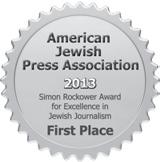

MANAGING EDITOR
Mala Blomquist | 602.639.5855 mblomquist@jewishaz.com
STAFF WRITER
Shannon Levitt | 602.639.5854 slevitt@jewishaz.com
ADVERTISING SALES CONSULTANT

Jodi Lipson | 602.639.5866 jlipson@jewishaz.com
SUBSCRIPTIONS 602.870.9470 x 1 subscriptions@jewishaz.com
GRAPHIC DESIGNER
Jay Sevidal | 410.902.2313 ads_phoenixjn@midatlanticmedia.com
Jr., Founder | 1948-1961
PROUD MEMBER OF
“I AM NOT TRYING TO MAKE REFORM JEWS BECOME ORTHODOX, I TRY TO HELP EVERY JEW BE THE BEST JEW THEY WANT TO BE.”
RABBI MICHAEL BEYO
It was really crazy.”
When the gold-buying craze started to wind down, Cohen decided to shift gears and return to his original roots in the jewelry business. In 2016, he opened Elite Fine Jewelers.
“We wanted to interact with people, to do good things for the community and good things for people,” said Cohen. “Not for one second do I have any regrets. It was the best thing I ever did. To be able to watch my kids increase the business is beyond my comprehension.”
The store’s daily operations are run as a family affair. Cohen, his wife and their three adult children Ashley, Justin and Abby, as well as his nephew Jake, can be found in the store at 805 N. Scottsdale Road in Tempe designing custom jewelry, holding consultations, buying, selling and trading diamonds and precious jewels — just as the Cohen family members before them had done in the 1950s.

Each one of the children have their own forte in the business. Justin Cohen became fascinated in high school with the grading system of diamonds and the factors used to classify them and has increased his knowledge over the years. Abby Cohen is an appraiser,
becoming a graduate gemologist from the Gemological Institute of America (GIA), one of the most prestigious credentials you can achieve in the industry.

“She did it in two years,” said Cohen. “I know people that took ten years to do it.”
Ashley Cohen-Isaacson is savvy with social media and handles the marketing aspect of the business. She also is the mother of two young boys, Ethan, 8 and Ezra, 5.
Cohen shared a piece of Jewish trivia about his grandsons’ genetics. “I’m a Cohanim [the priestly family of the Jewish people, members of the Tribe of Levi and direct descendants of Aaron, the brother of Moses] and my son-in-law is also a Cohanim. It’s fascinating — and rare — that a Cohanim’s daughter married another Cohanim.”
Genetics aside, Cohen is anxious to bring his grandsons to work. “I’m going to bring Ethan in on Saturdays to get him started,” said Cohen. “I’m determined to see at least four generations in the business.” He jokes that he’s already assigning the grandchildren titles: Justin’s 19-month-old daughter is going to be bookkeeper someday.
Not only does the family work together, but they also take vacations together. And even if they all go out to dinner, they talk about the business.
“If we’re all together, we will inevitably talk about the business and none of my kids have ever said, ‘We’re not talking business.’” said Cohen.
“Yeah, I’ve never felt like, ‘Enough! Would you stop talking about it?’” said Cohen-Isaacson. “It’s never anything that’s crossed my mind because it’s fun. It’s, ‘How could we do better? What ideas do we have for the future?’ It’s good brainstorming.”
Cohen-Isaacson said that it’s fun working with the family and sometimes customers don’t realize they are all siblings. “Sometimes we’ll bicker and I’m like, ‘Oh sorry, this is my sister, I wouldn’t normally talk to an employee like that.’”

At the end of the day though, she said everyone has each other’s back and steps in if someone is sick or there’s an issue with the kids.
“We are very blessed,” said Beth Cohen. “Everybody had an interest in it and wanted to keep it going.”

Larry Cohen said the secret is finding each child’s passion in the business early on. “This is what will continue bringing them in and wanting to come here — just like my father did for me.
“The excitement and the interest are so strong that they want to be here. Every one of my kids, whatever they’re doing, is passion driven.” JN

 SHANNON LEVITT | STAFF WRITER
SHANNON LEVITT | STAFF WRITER
Last month, 16 Chaparral High School students brought “I Never Saw Another Butterfly” to the Edinburgh Festival Fringe, one of the world’s biggest and best-known art and media events held annually in Edinburgh, Scotland. It was the fourth group of student actors and crew that Ed Como, Chaparral’s former theater head, had accompanied to the famous festival.
He said each of those trips was special in its own way, but “this time was the most meaningful by far.”
When Adena Astrowsky, vice president of Phoenix Holocaust Association and a founding member of 3GAZ (for second and third generation descendants of Holocaust survivors), first suggested the play to him, Como liked it, both for its powerful themes and its brevity. The latter increased its appeal as a candidate for the Fringe, where the maximum time for shows is 90 minutes and the guidelines don’t allow intermissions.
“I thought a play of around 45 minutes is best because it’s most comfortable for the audience,” Como said, adding the salient point: “A lot of venues aren’t air conditioned in Scotland.”
Then there’s the powerful nature of the show’s content.


The play, told from the point of view of survivor Raja Englanderova, is based on the poetry and drawings created by Jewish children at the Terezin concentration camp between 1942 and 1944. Raja shares her story of living in the camp while retaining an imaginary world filled with butterflies and flowers shared with the camp’s children.
The one-act show — culled from the original full-length play — was first performed on Chaparral High School’s stage in November 2021. Since not everyone in the original cast could make the trip to Scotland, some parts were recast in May.
Sarah Astrowsky, Adena’s daughter, was part of the original cast, but when she performed in Scotland, she took on a new role. After taking time to get into the character, “it got better and better,” she said.
“I felt more connected, and having my great grandmother as a survivor, I felt she was with me in Scotland.”
Now a freshman at University of Arizona studying film and television, with an eye toward a career in acting, writing and directing in Hollywood, Sarah said performing at the Fringe “was really eye-opening” and gave her a taste for professional theater. There was also the added bonus of impressing people she met in Edinburgh by telling them she was performing at the festival.
The best part, though, was the excitement of performing before an international audience and having people thank her for sharing the story.
“People would be crying after we finished and we talked to some people who didn’t expect it to be this sad,” she said. “It made me happy that we touched so many people.”
Sarah said through playing the part of Irena, she felt more connected to the history the show represents.
“I feel more respect and more connected,
and at a deeper level, I feel like I’m in it. I was really her. I’m not playing a made-up character. It’s a real-life person — they were kids.”
Astrowsky said it was “incredible” watching the students perform at the festival in Europe, in a beautiful theater, with people who had no personal connections coming to see the show.
Como, who retired at the end of last year after 30 years of teaching, described the festival’s rigorous rules. Each group has only 15 minutes to set up before the performance and 10 minutes to take down afterward. With such a tight turnaround, the cast and crew had to be swift and sure in their cues.
Of course, a big part of the show’s success was down to the actors, but Como also spotlighted the technical work of Austin Kaye, Broderick Schmidgall, Sonora Tooke and Bella Quinn. Additionally, Allison Moyers, a teacher at Cocopah Middle School, worked with Sarah to create the perfect front-of-house look at the Fringe. He also thanked the district and school administration for allowing the students to make the trip.
The “meaning and depth” of the show’s

theme made it successful, too, he said. “From that aspect, I was the most satisfied and proud of the decision to do it because it seemed important.”
Como took care that the show was never didactic or boring. To that end, the choices made with sound cues and visual projections helped. Without the benefit of a set, he said they created a multi-media show.
“I felt like our closing show was about as good as it could be,” he said. “It was really emotionally impactful and their best performance and I saw that people were emotionally impacted — it made them think.”
Como had one unexpected but welcome audience reaction. One of the people who worked for American High School Theatre Festival, the organization that provided the Fringe application and helped with logistics, told Como he had seen the play. His grandfather was a survivor, so he thought he was prepared and didn’t expect to be so affected by it.
“He came up to me and told me, ‘I wanted to let you know your show impacted me more than any other Holocaust-related play ever has.’”

Over 100 Jewish organizations are urging the Senate to codify the 2015 Supreme Court decision extending federal protections to same sex marriage.
“The Respect for Marriage Act would ensure that all federal benefits are available to married couples regardless of the state in which they live,” said the statement released Wednesday and spearheaded by the Reform movement’s Religious Action Center and Keshet, a Jewish LGBTQ rights group. “Congress has a responsibility to pursue economic equity for all, regardless of geographical location, and include historically marginalized groups in this pursuit.”
Agudath Israel of America, a haredi Orthodox umbrella body, objected to the proposed law, which has passed the U.S. House of Representatives and is now under consideration in the Senate.
Democrats, led by Rep. Jerry Nadler, the Jewish New York Democrat who chairs the House Judiciary Committee, advanced the bill, which was drawn up in the wake of the Supreme Court’s decision this summer to reverse its 1973 ruling guaranteeing abortion rights. Democrats fear the ruling could lead to the reversal of other rights, including the right to same sex marriage.
The lead author of the abortion rights reversal, Justice Samuel Alito, insisted that the decision would affect only abortion, but at least one of the five conservative justices joining in the decision, Clarence Thomas, said that the court should reverse the 2015 decision, Obergefell v Hodges, which guaranteed same sex marriage protections.
The new bill was at first seen as symbolic, but the strength of Republican support in the House — 47 Republicans voted in favor — surprised Democrats. It is now gaining traction in the Senate, where it is being spearheaded by a Republican, Susan Collins of Maine, and a Democrat, Tammy Baldwin of Wisconsin.
Collins is working to bring on board the 10 Republicans it would need to clear procedural hurdles, and she and Baldwin say they are open to changing the language to address Republican concerns, including extending protections to conservative religious institutions and denying them to polygamists.
That has led to a full court press from supporters and opponents of LGBTQ rights expansion. Joining the Reform movement and Keshet are the Conservative and Reconstructionist movements, the
National Council of Jewish Women, Hadassah, the Anti-Defamation League, the Jewish Council for Public Affairs and a number of local Jewish federations and community relations councils. The American Jewish Committee said in response to a Jewish Telegraphic Agency query that it does not generally sign letters of “this nature” but “we support the goals articulated in this letter.”

In a tweet illustrated with the LGBTQ rainbow flag, the Jewish Federations of North America said the bill “embodies our values of ensuring the civil rights of all who wish to be married, a goal we have supported both in the United States and Israel.”
The statement from Jewish groups supporting the bill cited Jewish teaching. “Jewish tradition teaches that all people are created b’tzelem Elohim, in the Divine image, and are worthy of dignity and respect,” it said. “As organizations grounded in Jewish values and beliefs, we have an ethical and moral responsibility to fight for a society that ensures the humanity of all people.”
Agudath Israel of America derided that position, saying that Jewish teachings opposed same sex marriage.

“Jewish law and values unequivocally reject homosexual conduct and same-sex marriage, both for Jews and for society at-large. Jewish law and values reject the notion that all people have a right to marry whomever they love, without restriction,” its statement said. “This is based neither in bigotry nor invidious discrimination. This is what our Torah teaches and what Jews have faithfully adhered to for millennia. We are deeply saddened that Jewish organizational supporters of RFMA have chosen to falsify the values they claim to represent.”
The Orthodox Union, the umbrella body for modern Orthodox Jews, declined a request for comment. JN
Four Arizona public officials, including the Republican candidate for secretary of state, appeared on a membership list of the Oath Keepers, an extremist anti-government group whose founder and leader has been charged in connection with the Jan. 6, 2021, insurrection at the U.S. Capitol.
On Sept. 6, the Anti-Defamation League released its report analyzing 38,000 names on the membership list and additional information leaked a year ago by Distributed Denial of Secrets (DDoSecrets), a nonprofit journalist collective.
The ADL’s report offered the caveat that simply being included on the list does not mean that any individual participated in the Oath Keepers’ activities or even still holds to its ideology; however, the list offers evidence of the organization’s success in inserting itself into mainstream American civil and public life.
Alex Friedfeld, one of ADL’s Center on Extremism (COE) researchers, told Jewish News that the Oath Keepers “view the government as an evil entity, and thus, legitimize action outside the bounds of a normal democratic society.”
He said this data leak provided a rare opportunity to learn “not only how far the group has spread, but also about the people holding key positions who have paid dues to the Oath Keepers.” This matters because they are perpetuating an ideology that threatens democracy.
“Whether they’re in law enforcement, politicians, military or first responders, they have influence, and the community looks up to them. They’re supposed to be paragons and leaders and they have access to real power. Their affiliation raises questions as to how they’re wielding that power,” Friedfeld said.
The COE researchers identified members who “hold sensitive positions” by comparing names in the data with public information, including from social media.
The researchers discovered a total of 1,471 Arizonans had signed up as members of the Oath Keepers. Of those, 13 are members of law enforcement, five are first responders, five are military members and four are elected officials:
Mark Finchem, Arizona House of Representatives
David L. Megahey, Young Public School District board member
Wendy Rogers, Arizona State Senator Jeff Serdy, Pinal County, District 5 supervisor
Finchem, the Republican candidate for secretary of state, has been public about his membership since he first ran for the state house to represent Tucson and Casa
Grande in 2014.
“I’m an Oath Keeper committed to the exercise of limited, constitutional governance. I stand against policies that expand the role of government in our lives which include Common Core, Medicaid expansion, extinguishment of long-standing water and land-use rights,” he stated on his campaign website.
Rogers, Flagstaff’s Republican state senator, is also a self-proclaimed member of the Oath Keepers and spoke to its Cottonwood chapter two months after the insurrection. She tweeted about the event on March 6, 2021:

“Had a great time speaking to the Cottonwood Oathkeepers {sic} tonight. I am a member of the Oathkeepers and I really like their dedication to our Constitution and to our country.”
Additionally, Arizona Rep. Quang Nguyen, R-Prescott Valley, who did not appear in the data leak, tweeted his membership in the group on May 30, 2022: “I’m an Oath Keeper. Do not ever forget it. Now what?”
Finchem’s and Rogers’ involvement with the Oath Keepers is well documented but Megahey’s and Serdy’s is not. Jewish News reached out to Megahey and Serdy, but they did not respond to a request for comment by press time.
While the ADL did not release the names of private citizens or most military and law enforcement officers on the membership list, it did name Allen Muma, Jerome’s chief of police.
Muma told Jewish News that he is not
a member of the Oath Keepers nor would he be because of the group’s extremist elements, which he abhors. However, he does remember being contacted by the group about a decade ago and taking their oath, which, he said, “is the same as my constitutional oath.”
He said that it’s possible he signed up at that time and perhaps even sent a small check, but he doesn’t recall doing so.
“It was a pretty benign situation at the time, the group and their goals,” Muma said. “They wanted to know that the police wouldn’t become what they were in Nazi Germany. I stand behind the constitutional rights of every man, woman and child in the United States.
“As law enforcement, we’ve gone through training to protect people’s rights, not to step on them.”
Muma has been in law enforcement for nearly 40 years and is currently the longesttenured police chief in Arizona. He says his success, in part, comes from knowing how to treat people with respect.
He said there are members of the Oath Keepers who are “nice, ordinary people,” but “the radical idiots you see in the news” make him wary of the group.
As far as appearing in the ADL’s report, he said, “It’s appalling to me that an agency grabs this data and goes running with it and accuses people. If you think I support that you’re strongly in error. I don’t promote anyone breaking the law on any side. My duty is preserving the law and the peace in my community. If they [Oath Keepers] were involved in Jan. 6, they should go to jail.”
The report also presented various comments found in the leaked data made by ordinary people who suggested they could act as missionaries for the Oath Keepers.
One of these comments came from an unnamed Phoenix resident: “I can recruit others to become Oath Keepers. Having produced over 900 Comedy shows for Veterans (in hospitals and homeless shelters, or outings that veterans could attend for free), I am good at producing shows and Friedfeld said the ADL is “very concerned about the rise of extremism in Arizona, particularly the rhetoric key figures are espousing about the election, such as Finchem saying he won’t concede if he loses, and Rogers, who is on the ballot even though she has espoused antisemitism and the language of white supremacy.”
Friedfeld said many people became members of the Oath Keepers once the group hit the mainstream in 2014. The part that worries him is that the group has held an extremist ideology from its founding and has never tried to hide it.
“These people didn’t just sign their name with no knowledge,” Friedfeld said. “You had to actively send money to the group.”
The Oath Keepers was founded in 2009 by Elmer Stewart Rhodes and promotes various conspiracy theories centered around a tyrannical U.S. government out to take civilians’ liberties. Members are encouraged to disobey orders they believe violate the U.S. Constitution. Rhodes and 10 other Oath Keeper members or associates have been charged with seditious conspiracy for attempting to overturn the results of the 2020 election and keep then-President Donald Trump in power, according to the Associated Press.
Friedfeld said that the group has struggled to maintain recruitment since Rhodes’ arrest and the legal scrutiny it faced after the Jan. 6 insurrection, because people became frustrated with the Oath Keepers’ disorganization and lack of local outreach.
“People get so upset when they don’t get their swag or the things they were promised when they signed up,” he said.
Still, Rhodes has never moderated his message. He continues to tell his followers to be armed and ready to fight back.
“We’re living in a time when extremism of all kinds is booming,” Friedfeld said. “We’re watching all of it in concert and these groups all feel emboldened to act publicly. They feel it’s OK to threaten and harass people, saying they [the federal government] are evil people doing evil things, making the idea of violence more plausible, and that is deeply alarming for the security of our communities and the future of our democracy.”

JACOB GURVIS | JTA

The 103rd season of the National Football League kicked off on Sept. 8, and there are a number of Jewish players to keep an eye on this year.
These are all of the Jewish players on NFL rosters entering Week 1 (listed in alphabetical order).
JAKE CURHAN
SEATTLE SEAHAWKS OFFENSIVE TACKLE
This Jewish summer camp alum and self-described “Bear Jew” — possibly a reference to “Inglourious Basterds,” or his 6-foot-6 and 315-pound frame, or both — is starting his second season with the Seahawks, who signed Curhan as an undrafted free agent last year. The 24-year-old appeared in 15 games in his rookie season, starting five at right tackle. Curhan will be an important piece on Seattle’s offensive line this season.
A.J. DILLON
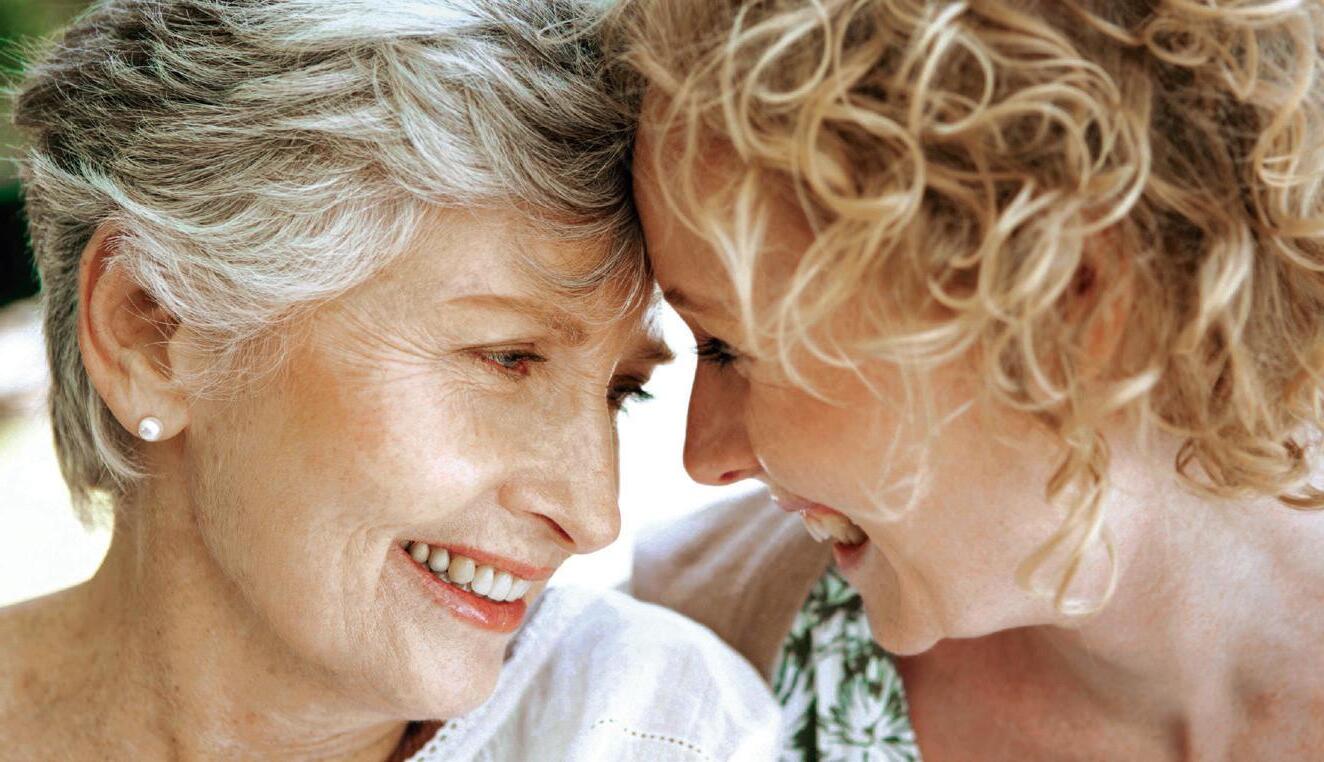
GREEN BAY PACKERS RUNNING BACK
The former Boston College star is entering his third season in the NFL, where he is the secondstring running back for Green Bay. Dillon rushed 803 yards last season with five rushing touchdowns and two receiving touchdowns. He spoke about his Jewish identity at the BBYO Jewish teen movement convention earlier this year — mentioning the time his mother joked that he “better be really good at this football thing,” to justify how much Hebrew School

he had to miss. Dillon has also made viral TikToks about being Jewish.
MICHAEL DUNN
CLEVELAND BROWNS OFFENSIVE LINEMAN
Dunn begins his third season with the Browns as a backup lineman after playing at the University of Maryland — which has one of the largest Jewish student bodies in the country. Prior to his time in Cleveland, Dunn bounced around with other NFL teams, the now-defunct Alliance of American Football and even the XFL. Dunn has appeared in 20 NFL games, including two starts.
ANTHONY FIRKSER
ATLANTA FALCONS TIGHT END
After four years with the Tennessee Titans, Firkser heads to
Atlanta this season, where he slates in as the second-string tight end. The Harvard alum — who had a bar mitzvah growing up in New Jersey and loves latkes — has started one game in each of the last three seasons and has scored five career touchdowns. Firkser is close with Greg Joseph (see below), a fellow Maccabiah Games alum, from their time together on the Tennessee Titans in 2019.
GREG JOSEPH, MINNESOTA VIKINGS KICKER
The South African-born Jewish day school grad is in his second season as the Vikings’ starting kicker. Joseph has sought out Jewish communities in each city he’s called home throughout his career, and last season he enjoyed an 87% field goal percentage, punctuated by a game-winner against the Packers in November.
The former UCLA star and 10th overall pick in the 2018 draft — the first great Jewish quarterback star hope in decades — has spent most of his young career behind high-profile QBs on the depth chart. This season, Rosen begins the season on the Browns practice squad, after failing to earn a roster spot during the preseason — despite an opening on the team after its starting quarterback Deshaun Watson was suspended for 11 games over sexual misconduct allegations. In 24 career games, the 25-yearold Rosen has not shined when given his chances: he has a measly 54% completion percentage and more interceptions (21) than touchdowns (12). JN
High Holiday season, as we seek spiritual and physical renewal for ourselves and our loved ones, let us also remember those in Israel who nurture and renew life every day.
save one life is to save the world entire.”
— The TalmudRunning back A.J. Dillon of the Green Bay Packers celebrates after rushing for a first half touchdown against the Baltimore Ravens in Baltimore, Dec. 19, 2021. COURTESY OF ROB CARR/GETTY IMAGES
In the end, everyone was an Elizabethan.
Queen Elizabeth II’s 70-year reign ended quietly with her death last week. And with the accolades from across the globe came a sense of wonder that the 96-year-old monarch’s greatest contribution may have been her steadfastness in her role as wearer of the crown of state and a symbol of continuity in the United Kingdom.
That remarkable constancy — a particularly British devotion to form and ceremony arising from England’s entrenched class system — was a fulfillment of Elizabeth’s promise very early in her reign of unending devotion to service and to her imperial family. Her formality in that role differed from the looser, more informal royals of Europe’s other remaining monarchies. But then, how many of us can name the king of Norway? (Answer: Harald V). Yet, somehow, although Americans may feel superior in not being weighed down by the pomp, the castles, the cost and calls to duty of an outdated monarchy structure, many Americans still thought
of Elizabeth II as “the” queen and felt an affinity toward her.
For British Jewry that was certainly true. Within months of acceding to the throne in 1952, Elizabeth met with the British chief rabbi and leaders of
community, with particular focus on interfaith relations and commemoration of the Holocaust.
And yet, the queen, who visited more than 100 countries during 271 foreign trips, never visited Israel. That was a
ELIZABETH’S DEATH MARKS THE END OF AN ERA. IN THE COURSE OF HER 70 YEARS OF SERVICE SHE OVERLAPPED WITH 15 BRITISH PRIME MINISTERS, 14 AMERICAN PRESIDENTS AND SEVEN POPES.
the Jewish community. Jewish leaders and the ambassador of the 4-year-old State of Israel attended her coronation soon after. And over the years of her long reign, she cultivated a warm and trusting relationship with the UK Jewish
source of frustration to British Jews and some Israeli officials. The reason was ascribed to the unsolved IsraeliPalestinian conflict along with other excuses, but it amounted to a de facto boycott of Israel.
Israel has a vexing problem. Under the uneasy status quo in place between Israel and the Palestinian Authority, the PA has responsibility for oversight of portions of the West Bank, including responsibility for security issues, while Israel watches close by. But the PA under President Mahmoud Abbas is fragile and ready to collapse, prompting fear that a political collapse will be followed quickly by the crumbling of the PA’s security services who are charged with keeping order, coordinating with the Israeli army and helping to protect Israelis nearby.
Over the past several weeks there has been an uptick in unrest and violence in the West Bank, including attacks on Israelis living there. This has led to Israeli military operations in areas under Palestinian control, with killings and arrests of suspected Palestinian terrorists. Those incursions — which are unquestionably necessary to protect lives and root out terror activity — are seen as having a problematic ripple effect: The incursions weaken the already tottering PA, which leads to a weakening of its
security services, which allows more antiIsrael violence, which increases Israeli security interventions in territory that is supposed to be overseen by the PA. In order to stop the PA’s slide, Israel has
wants to avoid taking any actions that opposition leader Benjamin Netanyahu might exploit. That is the case even though the construct of PA control in portions of the West Bank was established
THE STATUS QUO IS FRAUGHT WITH RISK. AND IT IS UNQUESTIONABLY IN ISRAEL’S BEST INTERESTS TO DEAL WITH THE ISSUES NOW RATHER THAN ALLOWING THINGS TO DETERIORATE FURTHER.
to stop intervening. But Israel needs to intervene in order to protect itself and its citizenry. A classic Catch-22.
All of this comes as the Israeli government is effectively frozen, as the country counts down to elections in November. Prime Minister Yair Lapid
by Netanyahu’s government when he was prime minister.
Although Israel seems resigned to not doing much to address the festering West Bank problems before the elections, it doesn’t appear that the U.S. is comfortable with that. It is for that reason that during
The boycott was lifted just five years ago when Prince William made the first official royal visit to Israel in 2018. There were, however, many unofficial visits. Prince Charles — now king — visited in 1995 and 2016 for the funerals of former Prime Ministers Yitzhak Rabin and Shimon Peres. But we can’t help but wonder whether the queen’s refusal to visit the Jewish state had an echo of British hostility toward the Jews of its colony in pre-state Palestine more than 70 years ago.
Today’s Israel was as surprised as anyone at how quickly the queen seemed to slip away after being a consistent fixture on the world stage for so long. Israel’s leaders joined other world leaders in mourning her passing and recognizing her legacy of leadership and service.
Elizabeth’s death marks the end of an era. In the course of her 70 years of service she overlapped with 15 British prime ministers, 14 American presidents and seven popes. May the memory of this gentle and devoted lady be for a blessing. JN
her recent visit to the region, Barbara Leaf, U.S. assistant secretary of state for Near Eastern Affairs, met with Israeli and Palestinian officials and emphasized the U.S. interest in strengthening cooperation with Israel and the Palestinian Authority and improving the quality of life for the Palestinian people, along with re-emphasis of the Administration’s continued support for a two-state solution. Leaf reportedly encouraged Israeli leadership to take steps to stabilize the Palestinian Authority. She also urged the PA not to pursue a bid for full membership at the United Nations Security Council but didn’t get to make that pitch to Abbas himself. Abbas refused to meet with Leaf — citing his “busy schedule.”
Where does this lead? We’re not sure. But the status quo is fraught with risk. And it is unquestionably in Israel’s best interests to deal with the issues now rather than allowing things to deteriorate further. Besides, what’s the point of waiting for what is projected to be another inconclusive election in November? JN
NOTE ON OPINION We are a diverse community. The views expressed in the signed opinion columns and letters to the editor published in the Jewish News are those of the authors. They do not necessarily reflect the views of the officers and boards of the Jewish Community Foundation, Center for Jewish Philanthropy, Jewish Federation of Greater Phoenix, Mid-Atlantic Media or the staff of the Jewish News. Letters must respond to content published by the Jewish News and should be a maximum of 200 words. They may be edited for space and clarity. Unsigned letters will not be published. Letters and op-ed submissions should be sent to editor@jewishaz.com.
The death of Queen Elizabeth II after 70 years on the throne is a devastating loss for Britain, the Commonwealth and the free world. It is hard to overstate the sense of grief that will be felt at her passing, including from within the Anglo-Jewish community.
I was brought up in a typical liberal Jewish family that showed a healthy respect for the queen, and the royal family more widely. I recall marching down the Mall in London for the 60th anniversary of VE Day and catching a sight of our monarch on the steps of Buckingham Palace. Like other British Jews, I also remember hearing the prayer for the royal family which was, and is, a feature of every Shabbat service.
For Anglo-Jewry, the queen was a rock and mainstay of her nation, a constant, familiar and reassuring presence amid the turbulence of both domestic and international crises. Indeed, she became such a fixture in British life that she created the illusion that she would always carry on as head of state. Of course, no one is immortal. But the queen etched herself so deeply into her country’s story that she became emblematic of its very character, the unspoken essence of modern Britain. She was truly the matriarch of the nation. The queen was unlike political heads of state. She was not a polarizing figure
Instead, she united her nation by becoming a symbol of its most enduring and cherished values. What she brought to her role was an old-fashioned sense of duty and loyalty, reflecting the vow that she made in 1947 to live a life of service, no matter how long or short it lasted. Her values were those of an older Britain, a nation framed by a Christian ethos in which self mattered less than duty and obligation trumped personal ambition.
Those values had resonance for British Jews
service. They recognized that the queen’s tireless devotion to her nation was an example of tikkun olam at its finest. The queen never compromised her fidelity to those values and conducted herself at all times with dignity, decency and propriety. If only one could say the same about today’s leaders.

Above all, she was a steadfast symbol of old-fashioned calm and stoicism in an age when the stiff upper lip was being assailed as quaint and harmful. It was that
facet of her character, her ability to show coolness and fortitude despite crisis and sadness, that endeared her to millions of her countrymen and women. In her own life, those sad episodes included the breakdown of her children’s marriages, the death of Princess Diana, the fallout caused by the disillusionment of Prince Harry and his wife with the monarchy, and, above all, the loss of her beloved husband, Prince Philip. Yet her belief in
ANDREA HODOS |
When I spoke recently at a conference on fighting antisemitism, I offered up one practical suggestion that might have surprised attendees: “I hope you’ll watch ‘Mo’ on Netflix.”
I was on a panel called “Combating Hate Through Coalition Building” and I was making the point that when we are building coalitions and calling on others to understand what is at stake for our community, reciprocity is essential: we must be willing to explore and understand what is at stake for others. For Jewish Americans who don’t (yet) know any Palestinian Americans, the new Netflix series “Mo,” created by Mo Amer, presents a wonderful starting place to understand a Palestinian American’s experience — on his own terms.
There is a human tendency to see members of one’s own community as individuals who are part of a highly
differentiated whole. Think about all the kinds of Jews you know – religious Jews, very religious Jews, secular Jews, rightwing, left-wing, Ashkenazi, Mizrahi, Jews of color. Given the diversity of the Jewish community, right about now you’re probably thinking of Jews I haven’t mentioned yet. And of course, each of these categories can be broken down with finer distinctions.
Just as there is a natural capacity to identify variation in our own communities, there is a tendency to perceive other communities as monoliths when we don’t have much proximity or exposure to individuals from those communities. This is especially true when there’s history between us.
I was invited to this panel because of my work building resilient relationships between Muslims and Jews. Each year in Los Angeles, we bring a diverse group of Muslims together with a diverse group of Jews to build authentic relationships,
strengthen listening and communication skills and collaborate in a meaningful way. We understand that conflict is natural and inevitable, but when we work to understand one another’s histories and what is at stake for each of us, conflict is not intractable. Daedra Staten, of SCG Diversity Consultants, reminds our group each year that we break biased thinking
when we are exposed to the specifics of people’s stories, especially when we expose more than one counter example. There are things you can do to challenge and stretch your own perspectives. Watching the specific and nuanced story of Mo Najjar’s family unfold over eight
I build relationships between Muslims and Jews. Here’s why you should watch ‘Mo’ on Netflix.
JTA

“As long as he is happy, I’m happy too!”
A friend shared these words with me recently, describing his cousin’s relationship with a lady he was dating. He didn’t think she was a good fit for him, but he dismissed his feelings with this lame excuse.
It wasn’t the first time I had heard this sentence. Many of us utter it, or different versions of it, to excuse all sorts of behaviors. We convince ourselves that as long as we are “happy,” almost any behavior is legitimized — from dating the wrong person to engaging in selfdestructive habits.
CONTINUED FROM PAGE 10
service and her promise to the nation meant that she never contemplated stepping aside. She simply got on with her job, exuding a steely strength and determination that won her so many admirers.
The queen was also an internationally renowned figure. It is easy to forget that she visited some 117 countries as monarch, meeting countless leaders, statesmen and diplomats. She acted as head of state to 15 British prime ministers and met no fewer than 13 American presidents. Indeed, her reign lasted more than one quarter of the entire history of the United States. She
NETFLIX
CONTINUED FROM PAGE 10
episodes is one of them.
Mo Amer is a stand-up comedian, and the series is very funny. The humor often comes from the absurdity of living as a stateless Palestinian-Texan-American asylum seeker whose Spanish is almost as good as his Arabic or English. The Najjars’ story is based on the real-life experiences of Amer’s own family, originally from Haifa, then Burin, through Kuwait from where his family also fled during the first Gulf war. It took Amer’s family 20 years to get citizenship in the United States. This is important to bear in mind as “Mo” takes you through all the situations the Najjars finds themselves in as they navigate the immigration and asylum process, work to stay afloat financially, and make sure they get the medical care
But I beg to differ. When we engage in behaviors that are opposed to our inner Divine beings, values and purpose, we cannot be happy. Dating a person who stifles our self-growth and engaging in behaviors that squash our infinite potential will not bring happiness. Other feelings, such as self-gratification and fleeting pleasures, may then emerge. But genuine happiness can only come from dedicating ourselves to the actualization of our Divine being, values and purpose.
“Happiness cannot be pursued,” Viktor Frankl wrote in his “Man’s Search for Meaning.” “Happiness must happen, and you have to let it happen by not caring about it. Instead, one should dedicate himself to actualizing his highest self; only then will true happiness ensue.”
Perhaps, this is the reason this week’s portion tells us that only after we have settled our land and worked hard to
was the first British monarch to travel to a communist country when she toured Yugoslavia in 1972. She was a symbol of the reconciliation with Japan, receiving the emperor in the United Kingdom, while her visits to China and Russia in the 1980s and 1990s were equally significant. She also reflected a changed mood when she went to the Republic of Ireland in 2011, something that would have been unthinkable decades earlier. She was undoubtedly the most experienced diplomat of her age and a figure to whom many would turn for wise counsel.
She was also a friend of the Jewish community in the U.K. She met many faith leaders and gained the praise of figures such as the late Rabbi Lord Jonathan Sacks, who described her and
they need when wounds prove to be more than their mother’s Palestinian-style home-pressed olive oil has the capacity to heal (although, like Ashkenazi chicken soup and Windex in “My Big Fat Greek Wedding,” Mo’s mother’s olive oil performs magical feats).
In “Mo” there is a running joke that taps into the sense of invisibility I have heard expressed often by Palestinian Americans: Any time someone asks Mo where his family is from he answers, “Palestine.”
“Oh, Pakistan!” they say. “No, like Jerusalem,” says Mo. “Oh, Israel!” And then, with varying degrees of resignation from Mo: “Nope. Big branding problem.”
Depending on each PalestinianAmerican’s history and the particular context, it can be complicated, painful or confusing to introduce oneself in the U.S. context — there can be a great deal of pride, as well, in sharing one’s identity
fulfill our purpose of bettering our part of this world, then, and only then, will we “rejoice in all the good things G-d has given you and your household (Deuteronomy 26:11).”
As a young teen struggling to find my purpose in the vastness of our world, I recall seeking the advice of my dear mentor, world-scholar Rabbi Adin Steinsaltz, to confess to him that “I don’t know what I want to be ‘when I grow up.’” His poignant words have stayed with me until this very day:
“You ask a good question,” he told me. “But instead of asking what you want to be, ask what you ought to be and do. And if you ask what you ought to be and do at all times, your life will be happy, purposeful and satisfying to your inner ‘I.’”
He was right. In order to find happiness and fulfill our inner selves, we ought to ask what we ought to be and do. Am
the royal family as “one of the great unifying forces in Britain, a unity we need all the more, the more diverse religiously and culturally we become.” She hosted Israeli leaders in the U.K., including President Ephraim Katzir in 1976, and gave an honorary knighthood to Shimon Peres in 2008.
In 2000, she also inaugurated Britain’s first permanent memorial to the Holocaust and served as patron of the UK Holocaust Memorial Day Trust for a decade. It is true that she did not visit Israel as a monarch despite a number of entreaties from the country’s leaders. But this did not reflect any personal malice or bigotry and instead resulted from longstanding Foreign Office policy to avoid antagonizing Britain’s Arab allies.
with people who are genuinely wanting to learn more. It’s been wonderful to see the excitement in the Palestinian community as Mo Amer’s story appears on a major platform and makes it way onto screens across the country.
As I watched the semi-fictional Najjar family’s story unfold, in flashbacks and present time, I thought a lot about my friend Hedab. Important parts of the Najjar/Amer story resonated with what I know of Hedab’s family history: displaced first from Jaffa and then from Gaza to Kuwait, and finally to the United States. Hedab fought hard for a passport identifying her as she wanted to be known. Last summer, as violence raged in Gaza and Jerusalem, even as her own family in Gaza was under fire, Hedab spoke out against violence toward Jewish bystanders on the streets of Los Angeles, because she “knows how it feels to stand alone calling
I actualizing my God-given skills and talents? Am I fulfilling my responsibilities? Am I being true to my Divine being and purpose? Am I performing mitzvahs, today more than yesterday, yet much less than tomorrow?
If we can answer an affirmative “yes” to these questions, we will then undoubtedly find happiness, and we will each be blessed with a good, sweet and happy year. JN
Accordingly, the queen’s death has seen a genuine and palpable outpouring of grief from Jewish communal leaders of every denomination. British Jews are feeling the loss of this remarkable monarch as much as their gentile counterparts.
For now, Britain has a king who will provide the nation and Commonwealth with a sense of much needed continuity. But Queen Elizabeth II was a truly unique figure whose guiding presence symbolized unity, constancy and, above all, human decency. We will not see her like again. JN
The views and opinions expressed in this article are those of the author and do not necessarily reflect the views of JTA or its parent company, 70 Faces Media.
for peace and justice for your people.” I hope someday you will be able to hear Hedab’s textured and powerful story, too.
So this is an invitation to American Jews, especially those of us who don’t have relationships with individual Palestinians. Watch “Mo” with curiosity. Experience the complexity of the intergenerational relationships, and allow yourself to gain perspective on how this PalestinianAmerican family defines itself — and allow yourself to laugh. And after that, find a different Palestinian story to listen to or read. Start breaking down the monolith. After all, wouldn’t you want someone who has a limited understanding of Jews to do that for us? JN
The views and opinions expressed in this article are those of the author and do not necessarily reflect the views of JTA or its parent company, 70 Faces Media.
It’s that time of year again: Rosh Hashanah is just around the corner and Jewish News wants to provide a few of the options for High Holiday services. While this is not a complete list, here’s a roundup of this year’s services, study sessions and more. Before you go, visit the synagogue’s website for more complete information. Also, check jewishphoenix.com/read/ high-holiday-virtual-services-2022/ JewishPhoenix.com for live updates during the week, and visit next Friday, Sept. 23, for our final guide to this year’s High Holiday services.
EAST VALLEY
Chabad of the East Valley High Holiday services are open to all, but reservations are required. For more information and to RSVP, visit chabadcenter.com.
Erev Rosh Hashanah Service: Sunday, Sept. 25 at 6:30 p.m.
Rosh Hashanah Day I Morning Service: Monday, Sept. 26 at 9:30 a.m. Tashlich and Shofar Blowing: Monday, Sept. 26 at 5:30 p.m. at Desert Breeze Park in Chandler

Day 1 Evening Service: Monday, Sept. 26 at 7:30 p.m.
Day 2 Morning Service: Tuesday, Sept. 27 at 9:30 a.m.
Shofar Blowing: Tuesday, Sept. 27 at 11:30 a.m.
Day 2 Evening Service: Tuesday, Sept. 27 at 6:15 p.m.
Kol Nidre: Tuesday, Oct. 4 at 6:00 p.m.
Yom Kippur Morning Service: Wednesday, Oct. 5 at 9:30 a.m.
Yizkor: Wednesday, Oct. 5 at 12 p.m.
Mincha and Neilah: Wednesday, Oct. 5 at 4:00 p.m.

Break the Fast: Wednesday, Oct. 5 at 6:50
p.m. followed by a buffet
Chabad Jewish Center of Gilbert
High Holiday services are open to all, but reservations are required. For more information and to RSVP, visit jewishgilbert.com.
Rosh Hashanah Day I Morning Service: Monday, Sept. 26 at 9:30 a.m.
Rosh Hashanah Day II Morning Service: Tuesday, Sept. 27 at 9:30 a.m.
Tashlich: Tuesday, Sept. 27 at 5:30 p.m. in the Power Ranch Community
Kol Nidre: Tuesday, Oct. 4 at 6 p.m.

Yom Kippur Morning Service: Wednesday, Oct. 5 at 9:30 a.m.
Closing Service and Break the Fast: Wednesday, Oct. 5 at 5:15 p.m.
Chabad Jewish Center of Mesa

Rosh Hashanah services will be held at Chabad of Mesa, 941 S. Maple, Mesa.
Yom Kippur services will be held at the Holiday Inn at 1600 S. Country Club Drive, Mesa. High Holiday services are open to all, but reservations are required. For more information and to RSVP, visit chabadmesa.com.

Erev Rosh Hashanah Service: Sunday, Sept. 25 at 6 p.m.
Shofar Blowing: Monday, Sept. 26 at 10:45 a.m.
Tashlich: Monday, Sept. 26 at 5 p.m.
Rosh Hashanah Day II Morning Service: Tuesday, Sept. 27 at 9:30 a.m.
Shofar Blowing: Tuesday, Sept. 27 at 10:45 a.m.
Kol Nidre Service: Tuesday, Oct. 4 at 6 p.m.
Yom Kippur Morning Service: Tuesday, Oct. 4 at 9:30 a.m.
Yizkor: Wednesday, Oct. 5 at 11:30 a.m.
Mincha and Neilah: Wednesday, Oct. 5 at 5 p.m.
When you’re here, you’re always near.
Sun Lakes Jewish Congregation
All High Holiday services will be held in person. For more information, visit sunlakesjewishcongregation.org/calendar/ calendar.html.
Erev Rosh Hashanah Service: Sunday, Sept. 25 at 7 p.m.
Rosh Hashanah Day I Morning Service:
Monday, Sept. 26 at 10 a.m.
Kol Nidre: Tuesday, Oct. 4 at 7 p.m.
Yom Kippur Morning Service: Wednesday, Oct. 5 at 10 a.m.
Break the Fast: Wednesday, Oct. 5 at Cottonwood Country Club. Reservations required.
Temple Beth Sholom of the East Valley
High Holiday services will take place in person and online. For more information or to buy tickets, visit tbsev.org.
Erev Rosh Hashanah Service: Sunday, Sept. 25 at 6 p.m.
Rosh Hashanah Day I Morning Service: Monday, Sept. 26 at 9 a.m.
Tashlich: Monday, Sept. 26 at 5 p.m.
Rosh Hashanah Day II Morning Service:
Tuesday, Sept. 27 at 9 a.m.
Kol Nidre: Tuesday, Oct. 4 at 6 p.m.
Yom Kippur Morning Service: Wednesday, Oct. 5 at 9 a.m.
Yizkor: Wednesday, Oct. 5 at 11 a.m. Neilah: Wednesday, Oct. 5 at 6 p.m.
Temple Emanuel of Tempe
High Holiday services will be in-person and on Zoom. Some will take place at Temple Emanuel of Tempe and others at Dayspring Methodist Church. For more information, visit emanueloftempe.org.
Erev Rosh Hashanah Service: Sunday, Sept. 25 at 7:30 p.m. at Dayspring Methodist Church; will be livestreamed
Rosh Hashanah Day I Morning Service: Monday, Sept. 26 at 10:15 a.m. at Dayspring Methodist Church; will be livestreamed
Rosh Hashanah Day II Morning Service: Tuesday, Sept. 27 at 10:15 a.m. at Temple Emanuel; via Zoom

Tashlich: Sunday, Oct. 2 at 10 a.m. at ASU Research Park
Kol Nidre: Tuesday, Oct. 4 at 7:30 p.m. at Dayspring Methodist Church; will be livestreamed
Yom Kippur Morning Service: Wednesday, Oct. 5 at 10:15 a.m. at Dayspring Methodist Church; will be livestreamed
Yizkor: Wednesday, Oct. 5 at 4:45 p.m. at Dayspring Methodist Church; will be livestreamed
Neilah: Wednesday, Oct. 5 at 5:45 p.m. at Dayspring Methodist Church; will be livestreamed
at Dayspring Methodist Church; RSVP by Sept. 28
PHOENIX
Beth Ami Temple
All High Holiday services will be in person at Gloria Christi Church. For more information, visit Bethamitemple.org/events.
Erev Rosh Hashanah Service: Sunday, Sept. 25 at 7:30 p.m.
Rosh Hashanah Day I Morning Service: Monday, Sept. 26 at 10 a.m.
Erev Yom Kippur Service: Tuesday, Oct. 4 at 7:30 p.m.

Oct. 5 at 10 a.m.
Yom Kippur Afternoon Service and Break the Fast: Wednesday, Oct. 5, 4-5 p.m.
Beth El Congregation
For more information, visit bethelphoenix.com.
Erev Rosh Hashanah Service: Sunday, Sept. 25 at 5:45 p.m.
Rosh Hashanah Day I Morning Service: Monday, Sept. 26 at 9 a.m. Shofar Service: Monday, Sept. 26 at 10:30 a.m.

Evening Service: Monday, Sept. 26 at 5:45 p.m.
Rosh Hashanah Day II Morning Service:
Tuesday, Sept. 27 at 9 a.m.
Kol Nidre: Tuesday, Oct. 4 at 5 p.m.
Yom Kippur Morning and Yizkor Service:
Wednesday, Oct. 5 at 9 a.m.
Mincha and Neilah Service: Wednesday, Oct. 5 at 4 p.m.
Chabad of North Phoenix
Rosh Hashanah services will be held at Chabad Lubavitch of North Phoenix, 22044 N. 44th St., Suite 100, Phoenix. Yom Kippur services will be held at Cambria Hotel, 4425 E. Irma Lane, Phoenix. All are welcome, no reservations required. For more information, visit ourjewishcenter.com.
Erev Rosh Hashanah Service: Sunday, Sept. 25 at 6 p.m.
Rosh Hashanah Day I Morning Service:
Monday, Sept. 26 at 9:30 a.m.
Shofar Blowing and Family Prayers:
Monday, Sept. 26 at 2 p.m.
Rosh Hashanah Day II Morning Service:
Tuesday, Sept. 27 at 9:30 a.m.
Kol Nidre: Tuesday, Oct. 4 at 5:45 p.m.
Yom Kippur Morning Service and Yizkor:
Wednesday, Oct. 5 at 9:30 a.m.
Neilah and Break the Fast: Wednesday, Oct. 5 at 5 p.m.
Chabad of Paradise Valley & Arcadia
Rosh Hashanah services will be held at the Andaz Resort, 6114 N. Scottsdale Rd. Yom Kippur services will be held at the Embassy Suites, 4415 E. Paradise Village Parkway. High Holiday services are open to all, but reservations are required. For more information and to RSVP, visit jewishparadisevalley.com.
Erev Rosh Hashanah Service: Sunday, Sept. 25 at 6:00 p.m.
Rosh Hashanah Day I Morning Service: Monday, Sept. 26 at 9:30 a.m.
Shofar Blowing: Monday, Sept. 26 at 11:30 a.m.
Rosh Hashanah Day II Morning Service: Tuesday, Sept. 27 at 9:30 a.m. at Chabad of Paradise Valley
Shofar Blowing: Tuesday, Sept. 27 at 11:30 a.m.
Kol Nidre: Tuesday, Oct. 4 at 6 p.m.
Yom Kippur Morning Service: Wednesday, Oct. 5 at 9:30 a.m.
Yizkor: Wednesday, Oct. 5 at 11:30 a.m. Mincha and Neilah: Wednesday, Oct. 5 at 5 p.m.
Chabad of Phoenix
All are welcome, no reservations required. For more information, visit chabadaz.com
Erev Rosh Hashanah Service: Sunday, Sept. 25 at 6 p.m.
Rosh Hashanah Day I Morning Service:
Monday, Sept. 26 at 9:30
Mincha: Monday, Sept. 26 at 5:30 p.m.
Tashlich and Shofar Blowing: Monday, Sept. 26 at 6 p.m. at Granada Park Lower Lake
Rosh Hashanah Day II Morning Service:
Tuesday, Sept. 27 at 9:30 a.m.
Mincha: Tuesday, Sept. 27 at 6 p.m.
Kol Nidre: Tuesday, Oct. 4 at 5:45 p.m.
Yom Kippur Morning Service and Yizkor:
Wednesday, Oct. 5 at 4:45 p.m.
Mincha and Neilah: Wednesday, Oct. 5 at 4:45 p.m.
Temple Chai
Registration and tickets are required for all services. For more information, visit templechai.com.
Rosh Hashanah Day I Morning Service:
Monday, Sept. 26 at 11 a.m.
Tashlich: Monday, Sept. 26 at 4:30 p.m. at Roadrunner Park
Rosh Hashanah Day II Morning Service: Tuesday, Sept. 27 at 10 a.m.
Kol Nidre Prayer Lab: Tuesday, Oct. 4 at 6 p.m.
Kol Nidre Traditional Service: Tuesday, Oct. 4 at 8 p.m.
Yom Kippur Morning Service: Wednesday, Oct. 5 at 11 a.m.
Yizkor and Neilah: Wednesday, Oct. 5 at 3:30 p.m.
Chabad of Scottsdale
High Holiday services are open to all, but reservations are appreciated. For more information and to RSVP, visit chabadofscottsdale.org.
Erev Rosh Hashanah Service: Sunday, Sept. 25 at 6 p.m.
Rosh Hashanah Day I Morning Services: Monday, Sept. 26 at 9:30 a.m.
Day 2 Morning Services: Tuesday, Sept. 27 at 9:30 a.m.
Kol Nidre: Tuesday, Oct. 4 at 5:45 p.m.
Yom Kippur Morning Service: Wednesday, Oct. 5 at 9:30 a.m.
Yizkor: Wednesday, Oct. 5 at 12:30 p.m.
Mincha and Neilah: Wednesday, Oct. 5 at 4:30 p.m.

Congregation Beth Israel
For tickets, reservations and more information, visit cbiaz.org/schedule-andregistration/.
Erev Rosh Hashanah Service: Sunday, Sept. 25 at 7:30 p.m. at Pilgrim Rest Baptist Church
Rosh Hashanah Day I Morning Service: Monday, Sept. 26 at 10:15 a.m. at Pilgrim Rest Baptist Church
Tashlich: Monday, Sept. 26 at 4:15 p.m. at Roadrunner Park.
Rosh Hashanah Day II Morning Service:
Tuesday, Sept. 27 at 10 a.m. at CBI
Kol Nidre: Tuesday, Oct. 4 at 7:30 p.m. at Pilgrim Rest Baptist Church
Yom Kippur Morning Service: Wednesday, Oct. 5 at 10:15 at Pilgrim Rest Baptist Church
Yizkor: Wednesday, Oct. 5 at 4:30 p.m. at CBI
Neilah and Havdalah: Wednesday, Oct. 5 at 5:15 p.m. at CBI
Congregation Or Tzion
Or Tzion will host a hybrid High Holiday service schedule. Participants must complete a registration form online and make a Gift of the Heart commitment. For more detailed information, visit congregationortzion.org and view the digital guidebook.
Erev Rosh Hashanah Service: Sunday, Sept. 25 at 6 p.m.
Rosh Hashanah Day I Early Morning Service: Monday, Sept. 26 at 8:30 a.m.
Rosh Hashanah Late Morning Service:

Monday, Sept. 26 at 11 a.m.
Rosh Hashanah Day II Morning Service:
Tuesday, Sept. 27 at 8:30 a.m.
Kol Nidre: Tuesday, Oct. 4 at 6 p.m.
Yom Kippur Morning Service: Wednesday, Oct. 5 at 9 a.m.
Neilah, Havdalah, Shofar blowing: Wednesday, Oct. 5 at 5:30 p.m.
Temple Beth Emeth of Scottsdale


All High Holiday services will be in person. For more information, visit tbescottsdale.org.
Rosh Hashanah Day I Morning Service:
Monday, Sept. 26 at 9:30 a.m.
Kol Nidre: Tuesday, Oct. 4 at 6 p.m.
Yom Kippur Morning Service: Wednesday, Oct. 5 at 9:30 a.m.
Yizkor: Wednesday, Oct. 5 at 11 a.m.
Neilah: Wednesday, Oct. 5 at 5:30 p.m.
Havdalah and Break the Fast: Wednesday, Oct. 5 at 6:30 p.m.
Temple Kol Ami
To reserve tickets and find more detailed information, visit templekolami.org or contact Nancy Drapin at nancyd@ templekolami.org.
Erev Rosh Hashanah Service: Sunday, Sept. 25 at 7:30 p.m.
Rosh Hashanah Day I Morning Service: Monday, Sept. 26 at 10 a.m.
Kol Nidre: Tuesday, Oct. 4 at 7:30

Yom Kippur Morning Service: Wednesday, Oct. 5 at 10 a.m.
Temple Solel Registration is required. For more information, visit templesolel.org.
Erev Rosh Hashanah Service: Sunday, Sept. 25 at 6:30 p.m.
Rosh Hashanah Day I Morning Service: Monday, Sept. 26 at 12 p.m.
Tashlich: Monday, Sept. 26 at 4 p.m. at Chart House
Kol Nidre: Tuesday, Oct. 4 at 6:30 p.m.
Yom Kippur Day Service: Wednesday, Oct. 5 at 12 p.m.
Yizkor, Neilah: Wednesday, Oct. 5 at 4:30 p.m.

The New Shul
All are welcome and no reservations necessary. In lieu of tickets, the synagogue asks for a small donation. For more detailed information, visit thenewshul.org/days-ofawe-2022/.
Erev Rosh Hashanah Service: Sunday, Sept. 25 at 6 p.m.

Rosh Hashanah Day I Morning Service: Monday, Sept. 26 at 8:15 a.m.
Tashlich: Monday, Sept. 26 at 1 p.m. Meet at shul entrance.
Erev Rosh Hashanah Day II Service: Tuesday, Sept. 27 at 8:15 a.m.
Kol Nidre: Tuesday, Oct. 4 at 5:30 p.m.
Yom Kippur Morning Service: Wednesday, Oct. 5 at 8:15 a.m.
Yom Kippur Afternoon Service: Wednesday, Oct. 5 at 3:45 p.m.
Beth Emeth Congregation of the West Valley High Holiday services are free of charge. Tickets are required and available for pick up on Sept. 5.
Erev Rosh Hashanah Service: Sunday, Sept. 25 at 5:30 p.m.
Rosh Hashanah Day I Morning Service: Monday, Sept. 26 at 9:30 a.m.
Rosh Hashanah Day II Morning Service: Tuesday, Sept. 26 at 9:30 a.m.
Kol Nidre: Tuesday, Oct. 4 at 6 p.m.
Yom Kippur Morning Service: Wednesday, Oct. 5 at 10:30 a.m.
Yizkor: Wednesday, Oct. 5 at 11:30 a.m.
Neilah: Wednesday, Oct. 5 at 5:15 p.m.
Chabad of the West Valley High Holiday services are open to all, but reservations are required. For more information and to RSVP, visit ichabad.org.
Erev Rosh Hashanah Service: Sunday, Sept. 25 at 6:45 p.m.
Rosh Hashanah Day I Morning Service:
Monday, Sept. 26 at 9:30 a.m.
Tashlich: Monday, Sept. 26 at 1:30 p.m. at Waterside at Sierra Verde Park

Rosh Hashanah Day II Morning Service:
Tuesday, Sept. 27 at 9:30 a.m.
Kol Nidrei: Tuesday, Oct. 4 at 6:15 p.m.


Yom Kippur Morning Service and Yizkor:
Wednesday, Oct. 5 at 9:30 a.m.
Temple Beth Shalom
For more detailed information, visit tbsaz. org.
Erev Rosh Hashanah Service: Sunday, Sept. 25 at 7 p.m.
Rosh Hashanah Day I Morning Service:
Monday, Sept. 26 at 10 a.m.
Kol Nidre: Tuesday, Oct 4 at 7 p.m.



Yom Kippur Morning Service: Wednesday, Oct. 5 at 10 a.m.
Yizkor: Wednesday, Oct. 5 at 1 p.m.
Yom Kippur Afternoon Service:
Wednesday Oct. 5 at 4:30 p.m.
Chabad of Flagstaff
High Holiday services will be held at the Molly Blank Jewish Community Center, 930 W. University Ave., Flagstaff. For more detailed information, visit jewishflagstaff.com.
Erev Rosh Hashanah Service: Sunday, Sept.



Rosh Hashanah Day I Morning Service:
Monday, Sept. 26 at 10 a.m.
Tashlich: Monday, Sept 26 at 5 p.m. at Francis Short Pond
Rosh Hashanah Day II Morning Service:
Tuesday, Sept. 27 at 10 a.m.
Kol Nidre: Tuesday, Oct. 4 at 6 p.m.
Yom Kippur Morning Service: Wednesday, Oct. 5 at 10 a.m.
Yizkor: Wednesday, Oct. 5 at 12 p.m. Mincha and Neilah: Wednesday, Oct. 5 at 5 p.m.




Congregation Lev Shalom Reservations are required. For more detailed information, visit levshalomaz.org.

Sunday, Sept. 25 at 6 p.m.
Rosh Hashanah Day I Morning Service:

Monday, Sept. 26 at 10 a.m.
Tashlich: Monday, Sept. 26 at 4 p.m. at Frances Short Pond




Kol Nidre Service: Tuesday, Oct. 4 at 6:30 p.m.

Yom Kippur Morning Service and Yizkor:
Wednesday, Oct. 5 at 10 a.m.

Neilah: Wednesday, Oct. 5 at 5:30 p.m.

Temple B’rith Shalom
High Holiday services will be held at The Event Spot. For more detailed information, visit brithshalom-az.org.
Erev Rosh Hashanah Service: Sunday, Sept. 25 at 6 p.m.
Rosh Hashanah Day I Morning Service: Monday, Sept. 26 at 10 a.m.
Tashlich: Monday, Sept. 26, immediately following services at Fain Park
Kol Nidre: Tuesday, Oct. 4 at 6 p.m.


Yom Kippur Morning Service: Wednesday, Oct. 5 at 10 a.m.
Mincha, Yizkor and Neilah: Wednesday, Oct. 5 at 4 p.m.

Jewish Community of Sedona and the Verde Valley

All High Holiday services will be available online and in person. For non-members, email office@jcsvv.org for tickets. For more detailed information, visit jcsvv.org.
Erev Rosh Hashanah Evening Service: Sunday, Sept. 25 at 6:30 p.m.
Rosh Hashanah Day I Morning Service: Monday, Sept. 26, 10 a.m.
Tashlich: Monday, Sept. 26 at 4 p.m. at Los Abrigados at the Creek
Rosh Hashanah Day II Morning Service: Tuesday, Sept. 27 at 10 a.m. on Zoom





Kol Nidre: Tuesday, Oct. 4 at 6:30 p.m.
Yom Kippur Morning Service: Wednesday, Oct. 5 at 10 a.m.


Yizkor and Neilah: Wednesday, Oct. 5 at









Rachel Lipman cares deeply about preserving her Jewish family’s fifthgeneration winemaking business, Loew Vineyards, but the 28-year-old is keeping an eye on the future, too.

As one of the youngest winemakers in Maryland — if not the youngest — she’s pushing through boundaries in a traditionally male-dominated industry.
But that’s not all: Lipman is also educating customers about her family’s extraordinary legacy of producing unique wines — a 150-year-old family tradition that was nearly eradicated by the Holocaust.

Among the 14 wines currently available on the Loew Vineyards website, four are not wines in a traditional sense. They are meads, or honey wines, made from fermented honey — and therefore are well-suited for the upcoming High Holidays. Among the available varieties include cyser (mead with apple juice) and pyment (mead with grape juice).
A fifth-generation winemaker, Lipman’s method of making mead is not unlike the way her ancestors did it in Europe.
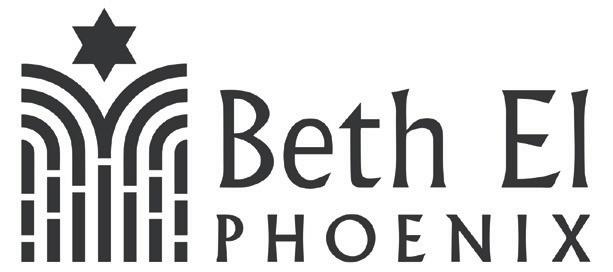
“My grandfather always says you can’t argue with success,” she said, referring to the family’s proprietary mead recipe.

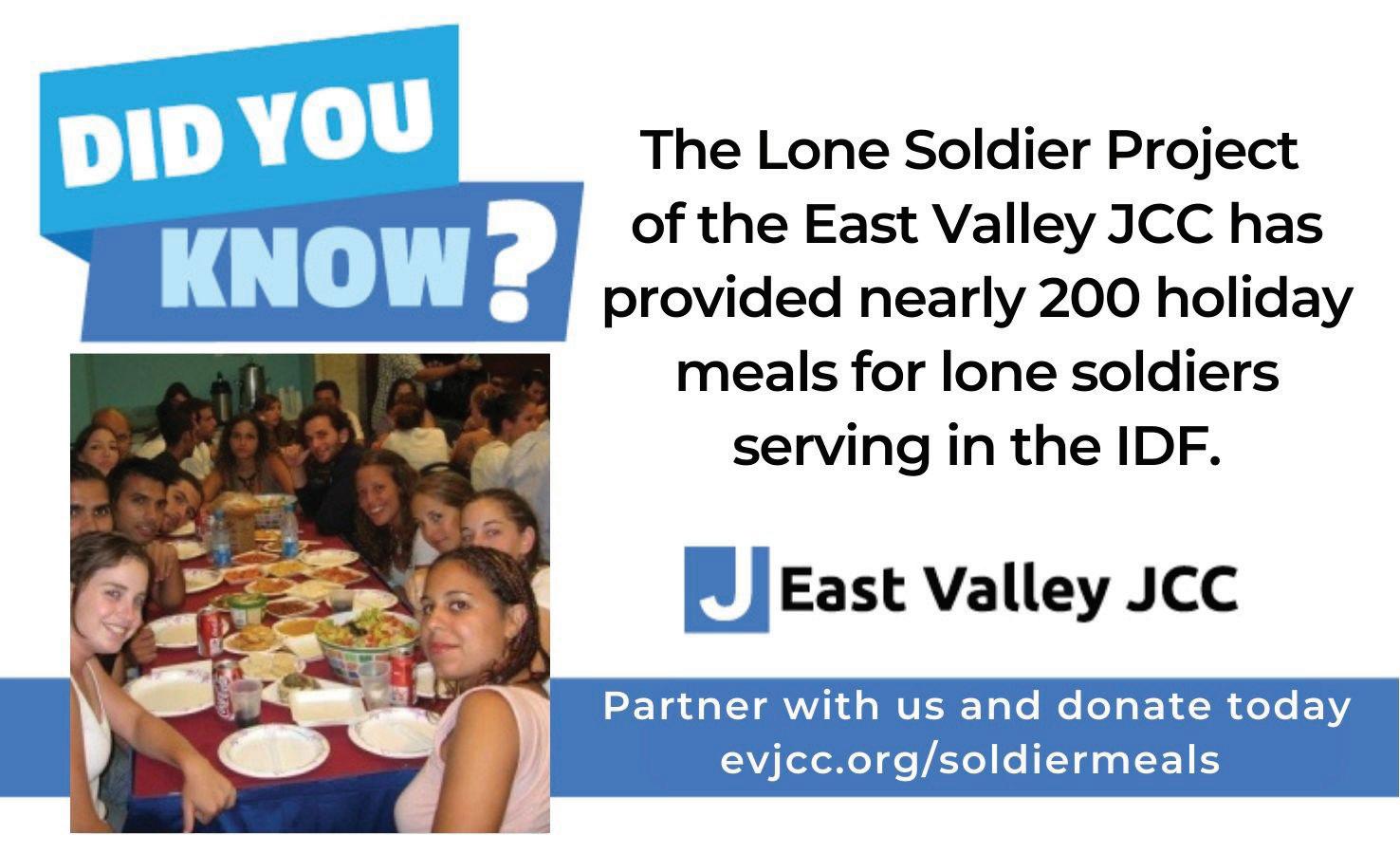
These days, Lipman uses modern machinery and loves scouring local farmers markets to discover new honey producers with whom she can collaborate.
Mead is having something of a moment. Lipman is naturally thrilled by the development, though she believes there is a misconception that all meads are sweet. Her family’s mead comes in varieties that


are dry, semi-dry and semi-sweet. “There is a lot of experimentation going on with mead right now, similar to craft beers,” she said. “I even heard of a peanut butter banana mead.”
Central to the story of Loew Vineyards is Lipman’s grandfather, who grew up in Lvov, Poland (now the Ukrainian city of Lviv) prior to World War II. Before the Holocaust, Lvov was home to Poland’s third-largest Jewish population, behind Warsaw and Lodz. The city had a Jewish population of some 200,000 — about one-third of the total — but only some 800 survived the genocide. The region also boasted many wineries, meaderies and distilleries, with the majority owned by Jews.
Lipman has spent much time uncovering her family’s mead-making past. During the long months of COVID, she has sifted through Polish documents, periodicals and newspapers to learn more. She discovered that the family meadery was in a district that housed warehouses, vodka distilleries, several meaderies and, yes, even a beer garden. In fact, the family business took up the length of an entire city block.
The patriarch of the Loew family in the mid-1800s was Meilech Loew, who made mead and distributed it internationally. Meilech and his wife, Malka, had 10 sons, two of whom created their own meaderies, while the others ventured into wine distribution and marketing. One son, Eisig, established the first national meadery facility in Poland. He and his wife, Clara, had three sons, one of whom was Wolfgang — Lipman’s grandfather, who Americanized his name
This Jewish family has been making honey wine for 150 yearsRACHEL MYERSON | KVELLER VIA JTA
to William (Bill) upon immigrating to the United States.

During the Holocaust, the family’s winemaking business was decimated — as were nearly all the members of the Loew family. Bill survived serving as part of the Underground, where his multilingual skills were highly prized. He was imprisoned in a Budapest political prison and two concentration camps, and eventually was liberated during a Dachau death march on April 23, 1945, by the U.S. Army’s 99th Infantry Division. Each year, the family commemorates this special day with Bill, 95, who remains involved with the business.
“It’s kind of like a birthday celebration for us,” Lipman said.

Once he arrived in America, Bill attended night school, married Lois Hendrickson and eventually became an electrical engineer. Yet the sweet smell of the barrels from his family’s meadery always remained a part of him. Upon retiring in 1982, he purchased a 37-acre plot in Frederick County, Maryland, with the aim of planting grapes and continuing his family’s wine and mead-making legacy.
“The way our family oriented ourselves, everything was about preserving the past,” Lipman said. “There was little discussion of the future.”
COVID-19, however, served as a pivotal moment for the family business.
Not only did Lipman have to safeguard her grandparents, who enjoyed interacting with customers in their tasting room, she knew she had to implement some operational changes if she wanted a sustainable future.
have been pushing for a future.”
Locating historical documents about her family required perseverance. Lipman joined a global Facebook group of meadmakers and posted about her family’s long tradition. Doing so helped her locate
AMONG THE 14 WINES CURRENTLY AVAILABLE ON THE LOEW VINEYARDS WEBSITE, FOUR ARE NOT WINES IN A TRADITIONAL SENSE. THEY ARE MEADS, OR HONEY WINES, MADE FROM FERMENTED HONEY — AND THEREFORE ARE WELL-SUITED FOR THE UPCOMING HIGH HOLIDAYS.

Citing Hillel the Elder’s iconic quote — “if not now, when?” — Lipman and her family made a significant investment in new fermentation tanks, which has allowed them to increase production to meet growing demand. They also remodeled the tasting room, created an online reservation system and updated their website to showcase the family’s long history in the business.
Lipman credits her grandmother with helping to facilitate a lot of the recent changes.
“She knows we have something that cannot die,” Lipman said of her grandmother. “Without her, we wouldn’t
DINNERS FOR
Available September 25 from 11am - 7pm
Inquire about delivery
Please reserve orders for 6 or more by September 22
Grilled Salmon $2499 per person
Braised Beef Brisket $22 99 per person
Roasted Chicken Breast $1899 per person
Meals Include: Roasted Red Potatoes and Carrot Tzimmes
USDA Choice Center Cut Beef Brisket Flat
$ 10.99 per lb Save $ 3 per lb
ajsfinefoods.com

Ask

mead labels from her great-grandfather’s business, and even an article in a Lvov newspaper about how her mead-making great-uncle collected tzedakah.
She also uncovered many documents that traced the history of mead in Europe — how it was predominantly produced by monks in the 1600s to its heyday in the 1800s through World War II.
“These documents just say the businesses disappeared after World War II,” Lipman said. “It doesn’t say that Jews owned these businesses and that is why they were gone. The people and the industry were destroyed by the Nazis. I intend to make that known.”
As the oldest grandchild, Lipman spent much of her childhood at her grandparents’ vineyard. From cooking Passover meals with her grandmother to riding on her grandfather’s tractors out to the vineyards, Lipman was and remains exceptionally close to her grandparents.
As she got older, her grandfather taught her chromatography, a technique that allows you to investigate the flavor of the wine. Lipman ultimately decided to study plant science at the University of Maryland and even interned at an organic vineyard in France’s Loire Valley.
Lipman doesn’t think her grandparents were intentionally grooming her to work on the vineyard, but does believe “they wanted me to love the vineyard as much as they do,” she said.
“When you are 21, you think, ‘Sure, being in the alcohol business sounds great!’ I worked at beer and wine stores then, but the more I learned about the industry, the more serious I became about it [as a future career],” she said.
Lipman hopes to continue to produce wines well into the future and watch the roots that her family planted so long ago continue to flourish. In the meantime, the Loew family looks forward to saying “L’chaim!”— “to life!” — over their wines this Rosh Hashanah, knowing all too well the meaning of the phrase. JN
Yom Kippur Break-the-Fast
Order by October 1st
THE BAGEL TRAY
$30 serves 12 Save $5
Assorted Bagels with cream cheese, butter, jams & jellies.
THE BAGEL NOSH
$79 serves 8 Save $10
Bagels complemented with cream cheese, Nova Salmon, capers, lemon wedges and sliced tomatoes & onions.
POACHED SALMON
$95 serves 8-10 Save $15
Whole Salmon fillet served cold with AJ’s Cucumber Dill sauce.
Save $5 on any
FRESH FRUIT TRAY
A bountiful assortment of fresh seasonal fruit.
$25 Small serves 6-10
$35 Medium serves 12-14
$ 45 Large serves 16-20
Save $5 on any
MINI DESSERT TRAY
Sumptuous mini pastries and dessert bars.
$50 Small serves 10
$ 60 Medium serves 16
$70 Large serves 20
AVAILABLE BY THE POUND
• Chopped Chicken Liver
• Nova Salmon
• Whitefish Salad
Prices valid through October 5, 2022





LEAH
CRESSWELL | CONTRIBUTING WRITEREvery year, Rosh Hashanah comes around and it’s time to dig out all the apple and honey recipes to fill the new year with everything sweet. There are various beliefs as to where the apples and honey traditions originated, but for now, let’s just embrace them with this roundup of delicious apple recipes that are perfect for the New Year.

Here are two recipes for different variations of apple cake.
APPLE CAKE
LEAH KOENIG | MYJEWISHLEARNING
Everyone loves a great honey cake for Rosh Hashanah, but what about apple cake? This apple cake can also be poured into cups for muffins or made into healthier options by replacing flour with either whole wheat flour or ground flax seeds. Either way, it’s sure to be a beloved dessert option!
Ingredients
3 cups Golden Delicious or Granny Smith apples, peeled, cored and choped
2 teaspoons vanilla
3 eggs
1 cup canola oil
2 cups sugar
Celebrate Rosh
Hashana with Rango Honey.
1 teaspoon baking soda
1 teaspoon cinnamon
1 teaspoon salt
3 cups flour
1 cup chopped walnuts
Turbinado sugar (for sprinkling on top)
Directions
Combine flour, salt, cinnamon, and baking soda in a medium bowl and set aside.
Wishing you a happy, healthy and sweet new year!
WILLMENG CONSTRUCTION, INC.
has F/T position for Project Manager 2 in Phoenix, AZ. Duties: Mnge, coord, & supervise subcontrctrs, vendrs, & personnel to ensure work compltd on time w/in budget & qualty stdrds; Write bid pckgs to define prjct scope; Prep subcontrcts, P.O. agreemts, & cost cntrl budgets; Mnge monthly billing process.
Requires: MS Constrctn Mgmt, Civil Eng, or rltd + 6 mos exp OR BS
Constrctn Mgmt, Civil Eng, or rltd + 3 yrs exp. Bkgrd check reqd.
Email resume to careers@willmeng.com, Incl Job Code WCLP-PM2
In a second bowl, mix together sugar, oil, and vanilla. Add eggs one at a time and stir to combine. Pour wet mixture into the dry ingredients and stir until thoroughly combined. Fold in apples and walnuts (the batter will be thick).
Preheat oven to 350 degrees. Grease two loaf pans and spread half of the batter into each pan. Sprinkle the tops of each loaf with a little sugar and bake for approximately one hour, or until a toothpick stuck in the middle of the cake comes out clean.
RACHEL PATTISON | THE NOSHER
Our celiac friends deserve apple cake too! This cake may be missing the main ingredient of flour, but that certainly doesn’t stop it from being just as melt-inyour-mouth delicious as any other dessert! We think those without a gluten intolerance just might enjoy this recipe as well.
Ingredients
¼ cup coconut sugar or brown sugar
1 cup extra-virgin olive oil
2 large eggs, room temperature
2/3 cup honey
1 tsp vanilla extract
2.5 cups gluten-free baking flour
1 tsp baking powder
1 tsp baking soda
1 tsp ground cinnamon
1 tsp salt
1/8 tsp allspice
3 apples, peeled, cored and chopped into ¼-inch pieces (I recommend using a mixture of green and red apples.)
2/3 cup walnuts, finely chopped (optional)
Unsweetened plain almond milk (optional)
Directions
Preheat oven to 325 degrees. Grease and lightly flour a 9-inch bundt pan (nonstick, if you have one).
In a stand mixer, beat together the sugar and olive oil. Beat in the eggs, then the honey and vanilla. Turn off the stand mixer.
In a separate large bowl, stir together the gluten-free flour, baking powder, baking soda, cinnamon, salt, and allspice.
Turn the stand mixer back on, and very slowly add the flour mixture to the wet
ingredients. Scrape down the sides of the bowl, ensuring that all of the ingredients become well incorporated.
Fold in the diced apples and walnuts. If you find that the mixture is too thick, you can add some almond milk, one tablespoon at a time, not to surpass ¼ cup.
Pour the batter into the prepared bundt pan and bake in the oven for 1 hour. Check the cake at the 50-minute mark. It is done when a toothpick inserted comes out clean. Once done, allow the cake to cool in the bundt pan for 15 minutes. Then, place a cake plate on top of the bundt pan and carefully flip the bundt pan so the cake lands directly onto the cake plate.
Allow the cake to cool completely and then dust lightly with confectioners’ sugar.
Recipes for the following sweet and savory dishes — and more — can be found jewishphoenix.com/read/eight-applerecipes-that-are-perfect-for-the-new-year/.
Kosher.com
Challah
While on the topic of baked goods, we figured it was time to throw an apple challah into the mix. This apple cinnamon recipe will definitely be a Rosh Hashanah dinner staple year after year. With apples, cinnamon, and honey, this sweet treat will hit the spot for anyone looking for a tasty twist to challah. We think it can even be a flavor all year long – especially in the fall!
Many Rosh Hashanah dinner tables are going to have some form of vegetable on them. Why not make it an apple, pomegranate, date salad? This recipe has so many things to love and combines sweet, salty, and savory for the perfect mouthwatering creation. The best part is it can accompany just about everything perfectly to complete a family dinner.
One may not think apples and chicken pair well, but we’re here to tell you that it is possible and they work well together! If you’re already preparing chicken for your Rosh Hashanah meal, you might as well gather up all the leftover apples and extra honey lying around and use them in this recipe! You just may be adding apples to your chicken for more meals after enjoying this unique recipe! JN
As Rosh Hashanah approaches, you may find yourself hosting the new year’s celebration.
While food and family are essential to the holiday celebration, there are some homemaintenance tasks to tend to that will ensure you and your guests enjoy the holiday.
FIX LEAKY PLUMBING
Leaky faucets, while minor, may cause guests to think that a home is not well maintained. Most leaks originate from the on and off handle(s) rather than the faucet. Start with shutting off the water supply. If the faucet has two handles, check whether the water is warm or cold, thus indicating which handle is leaking. In most cases, the handle will have a pop-off button concealing screws or pins holding it in place. Remove the screws or pins, then remove the cartridge. Within the cartridge, you will see a rubber ring or washer that has gone bad, causing the leak. Replacements can be purchased at your local home store.
Reassemble the cartridge and handle before turning the water supply back on to check if the leak has been fixed.
If your toilet is running, look at its flapper valve, which is the usual suspect for causing toilets to run. The flapper valve opens when the toilet is flushed, thus allowing water to enter. It then closes to keep water in the tank for the next use. The rubber valve is susceptible to degradation over time, resulting in hardening or warping and preventing a water-tight seal. To replace it, shut off the water supply to the toilet. Then, while holding the flapper valve, pull to remove it from the clips that hold it in place. Place the new valve in the toilet, confirming a tight seal. Attach the new valve chain onto the trip arm and turn on the water. Flush a few times to test the valve. If it still runs, adjust the flapper until a water-tight seal is achieved.
Prevent funky-tasting brisket and kugel. Perform a thorough inspection of the oven before cooking, especially if it’s been a year
or more since it was last cleaned. Over time, food can leave deposits that can slowly build up. These deposits, when heated enough, can begin to smoke and create unfavorable odors, which food can pick up or smoke out your holiday guests.
Most ovens have a self-cleaning feature utilizing incredibly high temperatures, essentially turning any debris into a fine powder. It should be noted that overuse of this function can cause excessive wear and tear. Chemical cleaners can be used in place of a self-clean function. Be sure you read the product’s instructions and the oven’s ownership manual before applying. In most cases, simply spray and wipe away the debris. IMPORTANT: these cleaners can be very corrosive. If you prefer a greener method, soak the oven racks in hot water and vinegar before rinsing. The longer the soak, the better. Mix baking soda and

water into a paste before spreading it onto the interior of the oven. Let the paste sit overnight before wiping it down. Clear the refrigerator of old, stinky food and thoroughly wash the compartments and shelves. A clean refrigerator will make it easier to put leftovers away and prevent odors from other foods from ruining the next night’s meal. Also, make sure the condensate line is clear — it can get clogged and make the refrigerator leak.
An often-overlooked aspect of holiday hosting is parking. Adequate parking, or lack thereof, can create headaches for guests. Contact your HOA regarding parking rules and restrictions.

Because we ' re mortgage experts, our average clear to close last year was just 13 days 50+ Lending Partners


We partner with 50+ lenders and have access to 100s of loan products We'll personally shop our lenders to get you the loan for your scenario Nationwide

We're licensed in 49 states! No matter where you live or where you ' re headed, we ' ve got you covered

 OPHIR GROSS
OPHIR GROSS
Ithink we all can agree the past two years have been one heck of a ride. We’ve collectively experienced an unparalleled phenomenon no one could have imagined — otherwise known as the COVID19 pandemic. Among fear, loss and tragedy, we also experienced silence. The world stopped. People stopped working. Stopped going to school. Stopped gathering. Stopped celebrating. Stopped socializing. Our monotonous routines halted as we waited in ambiguity.
Economists predicted massive long-term repercussions due to the lack of productivity in almost every industry, but not many anticipated the housing market frenzy that was to follow. With interest rates dropping as low as 2.65%, everyone wanted a slice, thus creating another phenomenon, but this time within the housing market. It was war out there. Home prices were at an all-time high, while inventory was at an all-time low. Buyers were suiting up with their highest and best terms — offering tens of thousands over asking price, waiving appraisals and inspections, just to be outbid by the more appealing offer. Listings were seeing multiple offers within days of entering the market. Buyers felt exhausted and defeated. Many experienced rejected offers — over and over again. I’m happy to report, we can all say bye-bye to buyer’s fatigue, as the housing market has shifted in favor to buyers.
Calling out to all fatigued buyers — your time to shine is now. The days of scrambling to view, offer and wait for rejection are things of the past as housing supply increases. Within the last six months alone, we’ve seen inventory increase exponentially. The number of active listings currently on the market is upwards of 18,000 and continues to
increase daily, compared to the measly 5,000 listings back in April of this year. With more inventory to choose from, the pressure is immensely lifted.

In addition to more inventory available to buyers, the rush of the recent frenzy is eliminated, as listings are on the market for longer periods of time before going under contract. Buyers have a chance to breathe once again. They have more time to go over strategy with their trusted real estate representative and weigh out options for what might be the largest purchase they make in their lifetime.
Previously defeated buyers can also find relief in today’s market when it comes to the number of offers on a single listing. In highly desirable areas of the Greater Phoenix area, such as Scottsdale and Central Phoenix, listings were receiving as many as 15 offers, with each one attempting to outbid the other. Being
a first-time homebuyer or a buyer with limited liquidity was especially frustrating during this time and many avoided such listings all together, forcing them to settle on meek home options. In today’s market, we’ve seen a significant drop of offers per listing, allowing less seasoned buyers to have a fighting chance to win over their dream home.
And finally, the moment all you buyers have been waiting for, the drop in sales price. According to the Wilcox Report that covers residential real estate trends in Greater Phoenix, the median purchase price for single family homes in Maricopa County went down for the second consecutive month. And if that isn’t good enough, seller concessions, such as credits and rate buy-downs, have made a comeback in today’s market as sellers recognize the shift in buying behavior.
Buyers, it’s time to rejoice and live again. No need to stressfully rush to make offers on overpriced listings that are simply mediocre at best. No need to settle or forfeit the hopes and dreams you’ve envisioned for your home and the life you will create in your home. With more inventory on the market, less competitive offers and financial incentives, this buyer-friendly market provides the ideal environment to purchase your dream home, create memories and make up for the time that was lost. JN
Ophir Gross is a realtor with Coldwell Banker Realty and has a combined skillset of business strategy and consumer psychology. She is a member of NowGen Phoenix, attends Congregation Beth Tefillah and began her roots in the community at the Phoenix Hebrew Academy and, formerly, Jess Schwartz High School. She can be reached at ophir. gross@cbrealty.com or 480-794-0807.



Install pathway lighting leading to your home, sweep debris or dirt off the walkway and place fresh plants at the doorway. This will liven up the entryway to your home and create a more welcoming environment.

A deep clean of the house can go a long way in improving the overall look of your home. If you don’t have time to do that and the cooking, hire a professional cleaning service. You may want them to come back after the holiday to deep clean the kitchen from all the cooking.

Create a home away from home for overnight guests.
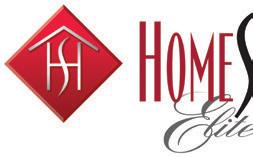

Prepare guest rooms and bathrooms for your guests. Make room in closets and dressers, fluff pillows, place fresh sheets on the bed and stock toiletries and other personal hygiene products.

Check closet doors for sticking. This may require the removal of the doors and inspecting them for any obvious faults. The tracks on the floor should be cleaned of debris. If you find that the tracks are bent, they can be straightened by holding a woodblock against them and tapping with a hammer. Lubricate the tracks before reinstalling the doors.
Place a nightlight in the bathroom, hallway and/or bedroom.

Ask what temperature your guests will be more comfortable in. If you like it cold, supply them with extra blankets or a robe. Stock the pantry and fridge with items your guests will enjoy. Be sure to inquire about special dietary needs.
With some prudent preparation, hosting Rosh Hashanah does not need to be a source of stress. It is a time for togetherness in celebration of the new year.
From all of us at Rosie on the House, we wish you and yours a shanah tovah u’metuka! JN
Rosie

Romero, Jr. is co-owner of Arizona’s home improvement radio program ‘Rosie on the House.

7-8:30 p.m. Join the National Council of Jewish Women Arizona online for an evening featuring speakers and subject matter experts discussing our rights, democracy and freedoms during this important midterm election. For more information, visit ncjwaz.org.
FRIDAY, SEPT. 16
Wine & Cheese Open House: 6:30-7:30 p.m.
Join Beth Ami Temple, 3535 E. Lincoln Dr., Paradise Valley for an opportunity to meet Rabbi Allison Lawton and Cantorial Soloist Michael Robbins and mingle with current members and other guests while learning more about the congregation’s High Holiday and Shabbat services. For more information, visit bethamitemple.org.
SATURDAY, SEPT. 17
September Kids Night Out at The J: 6-10 p.m. Families can drop off their kids at the Valley of the Sun Jewish Community Center, 12701 N. Scottsdale Road, Scottsdale and have a well-deserved night out! Kids can enjoy games, movies, a pizza dinner and more. For more information, visit vosjcc.org.
MONDAY, SEPT. 19
Gesher & BBYO Monday Night Fun: 7 p.m.
Jewish teens of all abilities are invited to join Gesher Disability Resources, 12701 N. Scottsdale Road, Scottsdale and BBYO for some Monday night fun. Meet in the Gesher office and choose a group activity for the evening. Must be in high school and register in advance. Vaccination is requested. Contact info@gesherdr.org for the registration link.
TUESDAY, SEPT. 20
Entenmann’s Extravaganza Singles
Event at The J: 7-9 p.m. Join the Valley of the Sun Jewish Community Center, 12701 N. Scottsdale Road, Scottsdale for an “Entenmann’s Extravaganza” singles event. This singles event has been specially designed for mature adults, ages 40 to 60. All attendees are invited to meet, schmooze and relax while enjoying many of the classic Entenmann’s donuts, cookies, cakes and pastries. Wine and coffee will also be served. Cost: $18 for The J members, $25 for non-members. Advanced registration required. For more information, call 480483-7121 or visit vosjcc.org.
MONDAYS
Mahjong: 10 a.m.-12:30 p.m. Join the East Valley Jewish Community Center, 908 N. Alma School Rd., Chandler in-person for mahjong. This program is intended for players with prior experience and for those who have received the COVID-19 vaccination. Masks will be required. Cost: Free. For more information and to register, visit evjcc.org/mahjong. For further questions, call the EVJCC at 480-897-0588.
Storytime at Modern Milk: 9:30 a.m. Join Modern Milk, 13802 N. Scottsdale Rd, #163,
Scottsdale for an in-person storytime for babies, toddlers and preschoolers. We will integrate favorite children’s books and songs while giving parents new ideas for play. Cost: $5. For more information and to register, visit modernmilk.com/after-baby.
SUNDAYS
BAGELS: 9-11 a.m. Join the Valley of the Sun Jewish Community Center, 12701 N. Scottsdale Rd., Scottsdale, for Bagels And Gabbing Every Last Sunday of the month in-person. Grab a bagel and a cup of coffee and enjoy some time with your friends and make new ones. You must register to attend. Bagels and coffee will be provided. Cost: Free for members, $5 for guests. For more information and to register, visit apm. activecommunities.com/valleyofthesunjcc/ Activity_Search/1787.
MONDAYS
Ethics of Our Fathers: 7 p.m. Learn with Rabbi Zalman Levertov online. Tune in at: bit.ly/2Y0wdgv. Cost: Free. For more information, visit chabadaz.com.
Quotable Quotes by our Sages: 7 p.m. Learn with Rabbi Shlomy Levertov online. Tune in at: JewishParadiseValley.com/ class. Cost: Free. For more information, visit chabadaz.com.
Partners in Torah: 7:30 p.m. Join a growing group of inspired learners with Project Inspire. Cost: Free. Tune in at: us04web. zoom.us/j/3940479736#success, password is 613. For more information, email Robin Meyerson at robin@projectinspireaz.com.
Learning to Trust in God: 7:30 p.m. Learn with Rabbi Yossi Friedman online. Tune in at: ChabadAZ.com/LiveClass. Cost: Free. For more information, visit chabadaz.com.
Torah & Tea: 7:30 p.m. Learn with Rabbi Yossie Shemtov online. Cost: Free. For more information, visit Facebook.com/ ChabadTucson.
TUESDAYS
Let’s Knit: 1:30-3:30 p.m. Share the pleasure of knitting, crocheting, etc. and help others with a project or pattern. Can’t knit? We can teach you! Every level welcome. We will be sitting outside at the Ina Levine Jewish Community Campus and social distancing. Cost: Free. For more information, email Nicole Garber at nicoleg@mpjcc.org.
Maintaining an Upbeat Attitude: 7 p.m. A class exclusively for people in their 20s
and 30s, learn how Jewish Mysticism can help with your attitude with Rabbi Shlomy Levertov online. Cost: Free. Tune in at: JewishParadiseValley.com/YJPclass. For more information, visit chabadaz.com.
WEDNESDAYS
History of the Jews: 11:00 a.m. Learn the Jewish journey from Genesis to Moshiach online with Rabbi Ephraim Zimmerman. Cost: Free. Tune in here: zoom. us/j/736434666. For more information, visit chabadaz.com.
Torah Study with Temple Beth Shalom of the West Valley: 11 a.m.-noon. TBS of the West Valley’s weekly virtual study group explores that week’s portion and studies different perspectives and debates the merits of various arguments. Intended for adults, Torah study is open to students of all levels. The goal is to achieve an understanding of what the text is and what it can teach us in the contemporary world. For more information, contact the TBS office at (623) 977-3240.
Happiness Hour: 11:30 a.m. An online class taught by Rabbi Pinchas Allouche that delves into texts and references culled from our traditions to address a relevant topic and draw uplifting life lessons from it. For more information or to join, visit cbtvirtualworld.com.
Torah Study with Chabad: Noon. Take a weekly journey to the soul of Torah online with Rabbi Yossi Levertov. Cost: Free. For more information, visit chabadaz.com.
Lunch & Learn: 12:15 PM. Grab some food and learn online with Rabbi Yehuda Ceitlin. Cost: Free. Tune in on Zoom by emailing info@ChabadTucson.com. For more information, visit ChabadTucson.com.
The Thirteen Petalled Rose: 1 p.m. An online Kabbalah class that studies “The Thirteen Petalled Rose” by Rabbi Adin Even-Israel Steinsaltz, focusing on the many foundational and transformational concepts of Kaballah and Jewish Mysticism and applying them to everyday life. For more information or to join, visit cbtvirtualworld.com.
Knit a Mitzvah: 1-30 p.m. On the second and fourth Wednesdays of the month, check in with fellow knitters who are making items to donate as part of this Brandeis National Committee Phoenix chapter study group. For more information, contact Ronee Siegel at ronees@aol.com.
JACS: 7:30-8:30 p.m. Virtual support group for Jewish alcoholics, addicts and their
friends and family on the first and third Wednesdays of the month. Cost: Free. For more information, email jacsarizona@gmail. com or call 602-692-1004.
Words & Whiskey: 8:30 p.m. Join a free weekly, virtual learning session for men. To RSVP, email rmollenaz@gmail.com or call/ text 310-709-3901.
THURSDAYS
Ladies Torah & Tea: 10:30 a.m. Learn about the women of the Torah with Mrs. Leah Levertov online. Cost: Free. Tune in at: ourjewishcenter.com/virtual. For more information, visit chabadaz.com.
Talmud - Maakos: 11 a.m. Learn with Rabbi Shlomy Levertov. Cost: Free. Tune in at: JewishParadiseValley.com/YJPclass. For more information, visit chabadaz.com.
Mindfulness Gatherings: Noon. Hosted by Hospice of the Valley via Zoom. Cost: Free. To join by phone, dial 1-253-2158782, meeting ID 486 920 2119#, to get the Zoom link or for further questions contact Gill Hamilton at ghamilton@hov.org or 602-748-3692.
The Science of Everything: 4 p.m. Explore the most fundamental work of Chassidut: the Tanya, with Rabbi Boruch. Cost: Free. Tune in at: zoom.us/j/736434666. For more information, visit chabadaz.com.
Teen Discussions: 7-8:30 p.m. Learn with Rabbi Tzvi Rimler online. Cost: Free. Tune in at cteen.clickmeeting.com/east-valley. For more information, visit chabadaz.com.
SATURDAYS
Saturday Mindfulness Gatherings: 9:30 a.m. Hosted by Hospice of the Valley. To join by phone, dial 1-253-215-8782, meeting ID 486 920 2119#. To get the Zoom link or for more information, contact Gill Hamilton at ghamilton@hov.org or 602-748-3692.
Middle Eastern Percussion - Beginner Level: 12:45-1:45 p.m. Join One World Dance and Music Studio, 3312 N. Third St., Phoenix to learn the fundamentals of Middle Eastern rhythms on tabla/doubek (drum), riq (tambourine) and zills (finger cymbals). Cost: $20 per class. For more information, visit oneworlddanceandmusic.com.
Book Discussion: 1:30-2:30 p.m. Join Or Adam Congregation for Humanistic Judaism on the third Saturday of every month for a virtual book discussion. For more information and to register, contact oradaminfo@gmail.com.
SUNDAYS
Soul Study: 7:15 a.m. An online class exploring the secrets of the Tanya and Jewish mysticism, taught by Rabbi Pinchas Allouche. Cost: Free.
Chassidus Class: 9 a.m. Learn about the Chasidic movement with Rabbi Yossi Friedman. Cost: Free. For more information, visit chabadaz.com.
Jewish War Veterans Post 210: 10 a.m. Any active duty service member or veteran is welcome to join monthly meetings, now virtual, every third Sunday, Cost: Free. For more information, email Michael Chambers at c365michael@yahoo.com.
AZ Jews for Pride’s leadership team work together to get ready to represent the Jewish community
Frank Jacobson celebrated his 74th birthday in style on Sept. 14, with a scotch and his family. Pictured clockwise from left are Frank Jacobson; Jonah, his grandson; Yosef Funke, his son-in-law; and Bobby Jacobson, his brother.
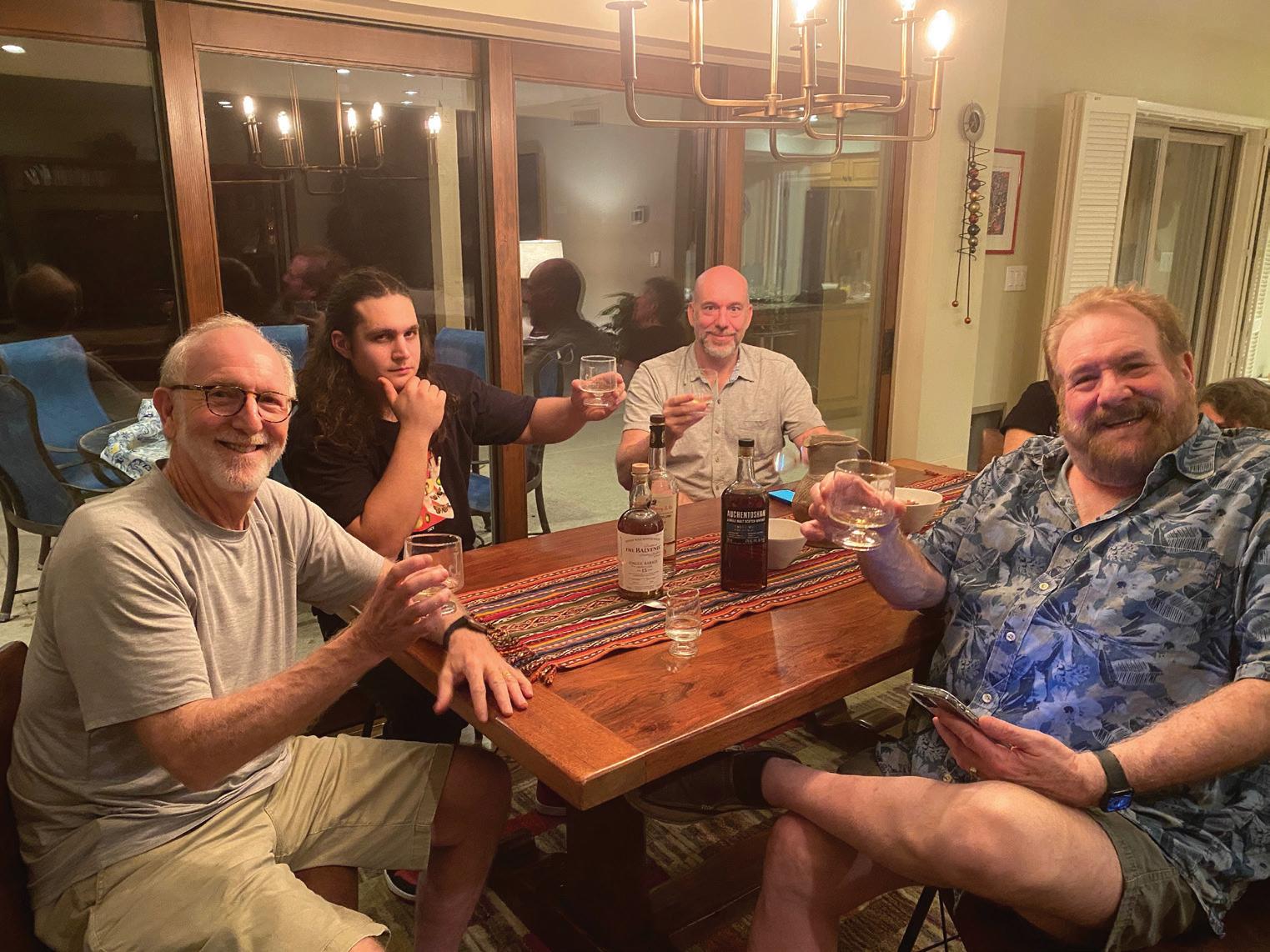
OF RABBI

Women gather at the East Valley Jewish Community Center on Aug. 29 to play mahjong during the EVJCC’s Mahjong Monday session.

Arizona Jews for Justice volunteers made hundreds of hygienic kit bags for people experiencing homelessnes.
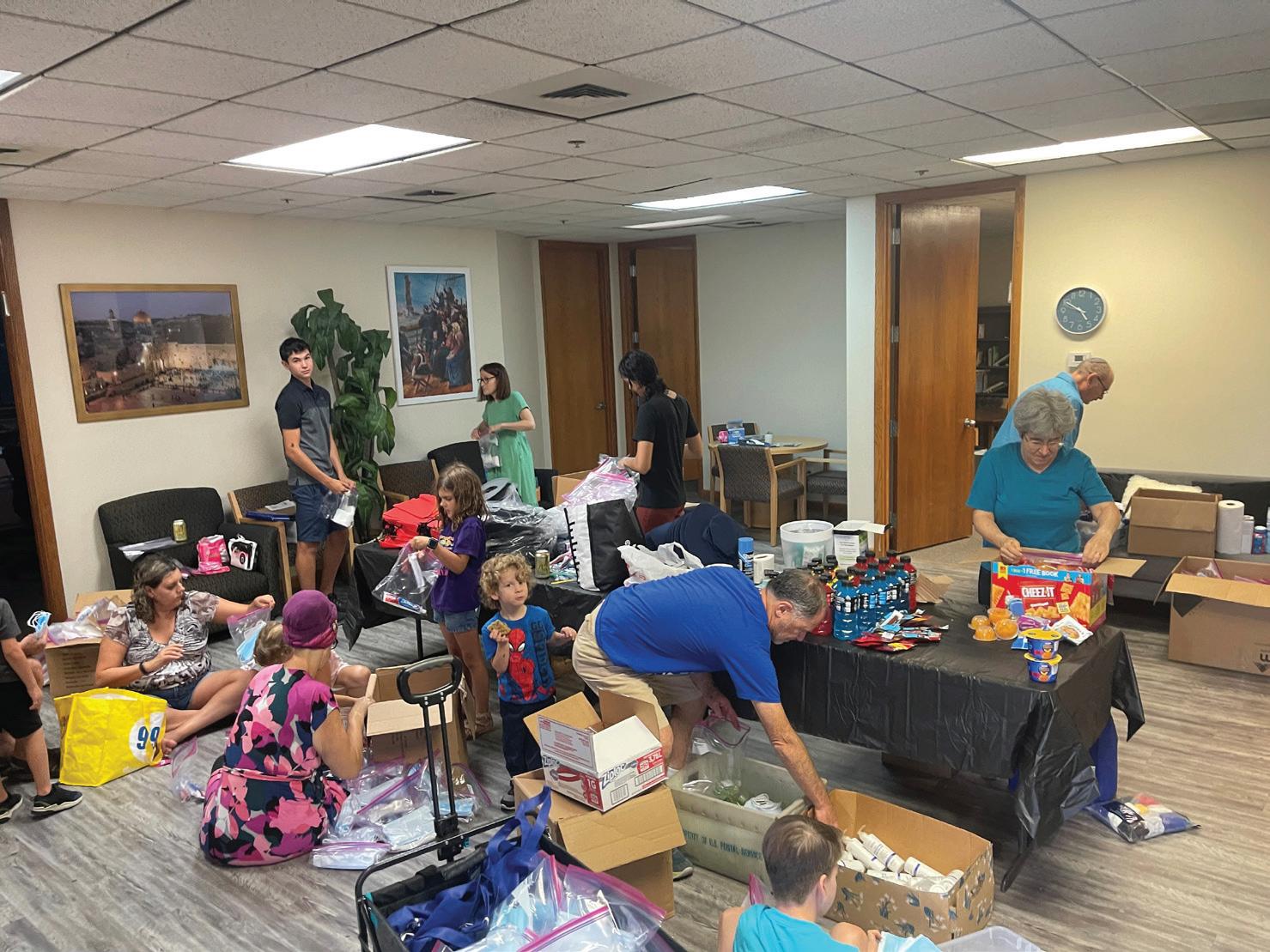
The Levenbaum Chabad House at ASU welcomed new students at the Freshman ChaBBQ on Aug. 14.


The Levenbaum Chabad House at ASU welcomed new students at the Freshman ChaBBQ on Aug. 14. COURTESY OF CHABAD AT ASU
Nearly 60 Holocaust survivors, family and friends gathered on Sept. 11 to enjoy lunch and music at Café Europa, a social and support program of Phoenix Holocaust Association. From left: Charlotte Adelman, Sheryl Bronkesh, Rise Stillman and Kathy Rood.
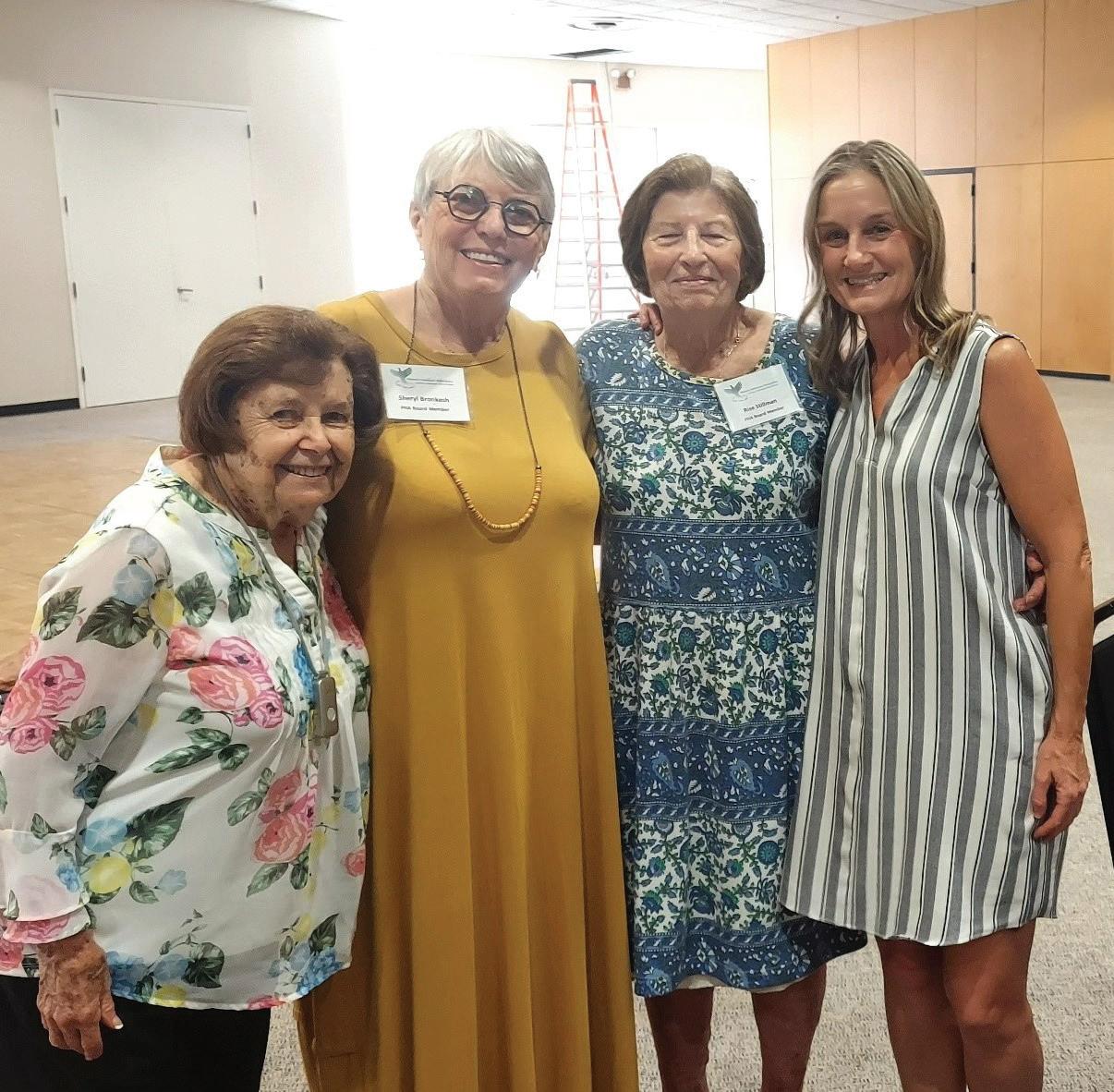
Anxiety in the Modern World: 6 p.m. Learn the secrets of the Torah for living stressfree in the current environment in a virtual class with Rabbi Boruch, with Chabad of Oro Valley. Cost: Free. Tune in using this link: zoom.us/j/736434666. For more information, visit chabadaz.com.
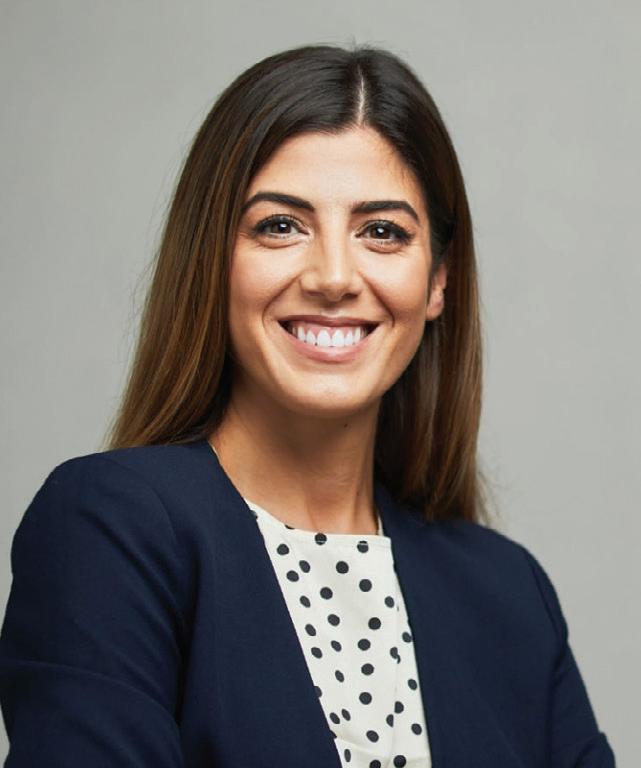
In-person services: Congregation Beth Israel is holding services in the Goldsmith Sanctuary limited to 100 people, excluding clergy and staff. Members and guests must be fully vaccinated (two weeks since your last vaccination) and wear a mask. Children may attend and must be able to wear a mask for the duration of the service. Participants must pre-register by Thursday at 5 p.m. Priority will be given to members first and then guests. If there are more requests than available seats a lottery system will be used. To make your reservation, contact Gail Gilmartin at 480951-0323 or at ggilmartin@cbiaz.org.
In-person services: Temple Chai is holding Friday evening (5:30 p.m. Nosh, 6:16 p.m. sevice) and Shabbat morning (varying dates and times). For more information, contact Sheana Abrams at (602) 971-1234 or sabrams@templechai.com.
In-person services: Congregation Or Tzion is holding Friday evening (6:00 p.m) and
Shabbat morning (9:30 a.m.) services indoors. Services are also live streamed at otaz.org/livestream. For more information about services, events and membership, visit congregationortzion.org or call 480-342-8858.
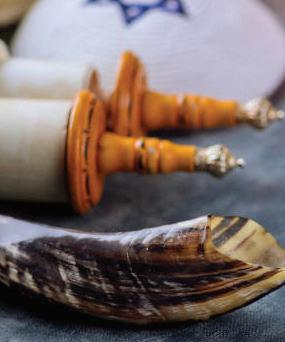
Baby & Me Shabbat: 9:30 a.m. on the first Friday of the month. Join the Bureau of Jewish Education of Greater Phoenix for this free program for parents and their little ones to welcome Shabbat. For more information, visit bjephoenix.org.
Tot Shabbat in the Park: 9:30 a.m. Free totShabbat every Friday morning at Cactus Park. Shabbat music, toys and a meaningful pre-school Shabbat experience. Is it your child’s birthday? Sponsor a Shabbat for $36.00. For more information and to register, visit playdatesbydesign.com/ upcoming-classes.
Shabbat at Beth El: 11-11:45 a.m. Celebrate Shabbat with songs, blessings and inspirational teachings. Rabbi Stein Kokin from Beth El Congregation will lead us the first Friday of every month. Special guests will be welcoming Shabbat during the remainder of the month. For more information or to join, visit bethelphoenix.com.
Welcome Shabbat : 11-11:45 a.m. Join the JFCS Virtual Center for Senior Enrichment each Friday for a soothing and inspiring program to welcome Shabbat. Each week a different guest host will lead the program with song and celebration. Cost: Free. For more information, visit jfcsaz. org/cse. JN
September 23
The High Holidays are made for tradition. Show our readers how your business can be a part of their memories.
September 23
Melvin Selbst of Scottsdale died Sept. 6, 2022. He was 94. He was born in Philadelphia, Pa. and was an active member of Beth Ami Temple, having been elected board president seven times.

Melvin is survived by his two children, five grandchildren and two greatgrandchildren. He was preceded in death by his beloved wife, Adrianne. Services were held on Sept. 8, 2022, at Mt. Sinai Cemetery, officiated by Rabbi Levi Levertov. Donations in his name can be made to Jewish National Fund (jnf.org) or Beth Ami Temple (bethamitemple.org).
MURRAY HARVEY COHEN, beloved physician, father, grandfather, and friend, died August 27, 2022, at the age of 90.
Murray was born in Philadelphia, Pa., on Oct. 5, 1931, to Sydney (Ginzburg) Cohen and Simon Z. Cohen. He graduated from Central High School and Temple University School of Pharmacy. He also graduated from Philadelphia College of Osteopathic Medicine and trained at Philadelphia Metropolitan Hospital. He focused his 60year career in gastroenterology.
Murray met his true love, Rochelle Kaplan, on a blind date in Philadelphia. They married in December of 1960 and moved to Phoenix two years later, where Murray began his medical practice. Rochelle and Murray were married for over 60 years until 13 months ago, when his wife Rochelle preceded him in death.
Murray was an accomplished and dedicated physician who loved the practice of medicine, and his patients loved him too. He served on multiple medical boards and was president of the American College of Osteopathic Internists. In addition, he was an editor of several medical journals and a faculty member, clinical instructor, and professor of medicine at several osteopathic colleges.
Murray will be remembered as a friend, husband, father, grandfather, and greatgrandfather. He is survived by a daughter, Cindy, son-in-law Steve Goldberg; grandchildren Joshua and Rachel (Jared Gilman); and great-granddaughter, Ava and a son.
We will forever remember the sparkle in his eye when he looked at us, the gift that always made those around him feel special.
To honor Murray, please consider a donation to Hospice of the Valley (hov.org/donate/ donate-now/).
October
older Jewish residents navigate retirement.
Show readers you are the expert in your field by offering great advice to Jewish News readers in your field of expertise.

Congregation Beth Tefillah is a welcoming, vibrant synagogue where you are sure to feel at home. Our name is an expression of our primary objective: to serve as a “house of prayer” and a spiritual lighthouse to every Jewish man, woman and child, regardless of background, affiliation or level of observance.








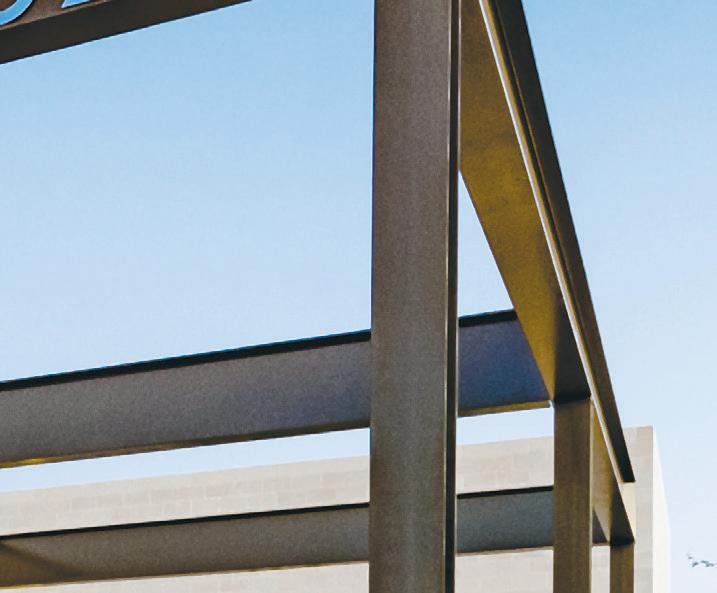
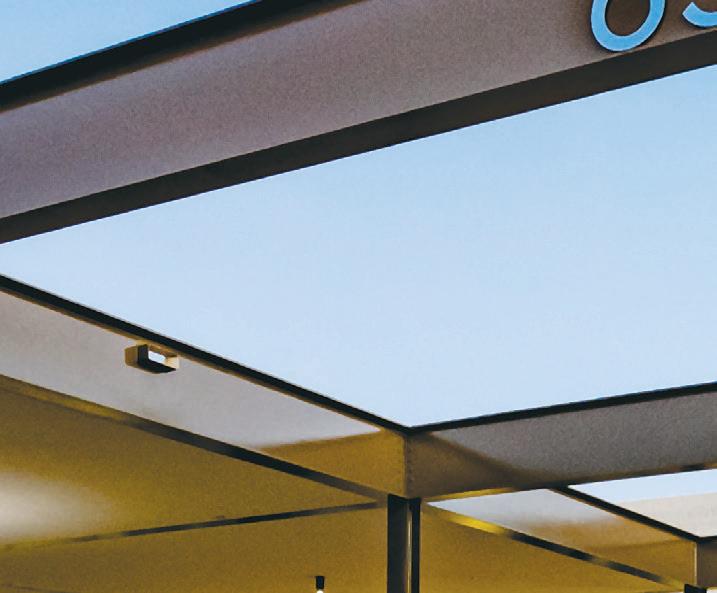




Congregation Beth Tefillah wishes that the year ahead will be filled with peace, happiness and health!
